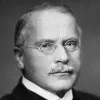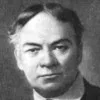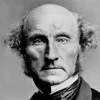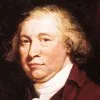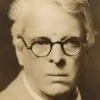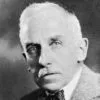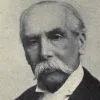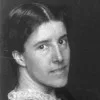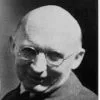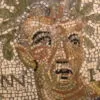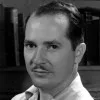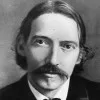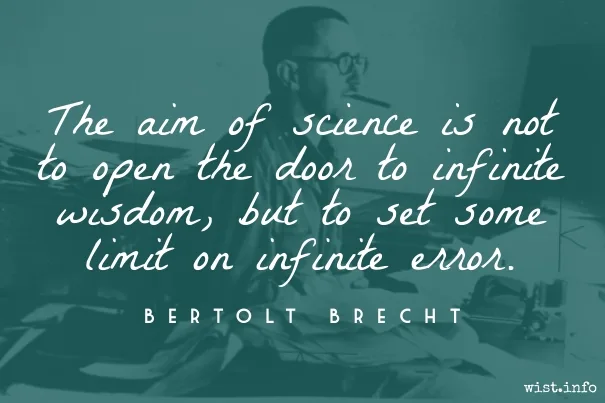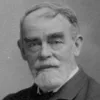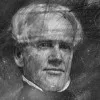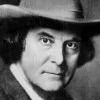Most of our misfortunes are more supportable than the comments of our friends upon them.
Charles Caleb "C. C." Colton (1780-1832) English cleric, writer, aphorist
Lacon: Or, Many Things in Few Words, Vol. 1, § 517 (1820)
(Source)
Quotations about:
error
Note not all quotations have been tagged, so Search may find additional quotes on this topic.
JESSICA: But love is blind, and lovers cannot see
The pretty follies that themselves commit.William Shakespeare (1564-1616) English dramatist and poet
Merchant of Venice, Act 2, sc. 6, l. 37ff (2.6.37-38) (1597)
(Source)
One of several times Shakespeare used the phrase, "Love is blind." He popularized it, but it was first used by Chaucer around 1404 in "The Merchant's Tale" ("For loue is blynd alday ...").
Madame de Tencin said that intelligent people often erred in their conduct because they could never believe that the world in general is as stupid as it is.
[Mme de Tencin disait que les gens d’esprit faisaient beaucoup de fautes en conduite, parce qu’ils ne croyaient jamais le monde assez bête, aussi bête qu’il l’est.]
Nicolas Chamfort (1741-1794) French writer, epigrammist (b. Nicolas-Sébastien Roch)
Products of Perfected Civilization [Produits de la Civilisation Perfectionnée], Part 2 “Characters and Anecdotes [Caractères et Anecdotes],” ¶ 715 (1795) [tr. Merwin (1969)]
(Source)
(Source (French)). Alternate translations:Mme de Tencin said that people with spirit make many mistakes in their actions because they never believe that society is brutish enough, as brutish as it is.
[tr. Siniscalchi (1994)]Madame de Tencin said that many very clever people made social blunders because they could never believe that society was quite as stupid as it really was.
[tr. Parmée (2003), ¶382]The great mistake made by intelligent people is to refuse to believe that the world is as stupid as it is.
[Forbes]
I value more than I despise
My tendency to sin,
Because it helps me sympathize
With all my tempted kin.Ella Wheeler Wilcox (1850-1919) American author, poet, temperance advocate, spiritualist
Poem (1906), “Understood,” st. 1, New Thought Pastels
(Source)
LOGIC, n. The art of thinking and reasoning in strict accordance with the limitations and incapacities of the human misunderstanding. The basis of logic is the syllogism, consisting of a major and a minor premise and a conclusion — thus:
Major Premise: Sixty men can do a piece of work sixty times as quickly as one man.
Minor Premise: One man can dig a post-hole in sixty seconds; therefore —
Conclusion: Sixty men can dig a post-hole in one second.
This may be called the syllogism arithmetical, in which, by combining logic and mathematics, we obtain a double certainty and are twice blessed.Ambrose Bierce (1842-1914?) American writer and journalist
“Logic,” The Cynic’s Word Book (1906)
(Source)
Included in The Devil's Dictionary (1911). Originally published in the "Cynic's Dictionary" column in the San Francisco Examiner (1887-09-04).
See Kettering.
Failure-resistant is achievable; failure-free is not.
Nassim Nicholas Taleb (b. 1960) Lebanese-American essayist, statistician, risk analyst, aphorist
The Bed of Procrustes: Philosophical and Practical Aphorisms, “Robustness and Antifragility” (2010)
(Source)
He should die young who says he has neither erred, strayed or been deceived.
Minna Antrim (1861-1950) American epigrammatist, writer
Naked Truth and Veiled Allusions (1902)
(Source)
For the robust, an error is information; for the fragile, an error is an error.
Nassim Nicholas Taleb (b. 1960) Lebanese-American essayist, statistician, risk analyst, aphorist
The Bed of Procrustes: Philosophical and Practical Aphorisms, “Robustness and Antifragility” (2010)
(Source)
Error is boundless.
Nor hope nor doubt,
Though both be groundless,
Will average out.J. V. Cunningham (1911-1985) American poet, literary critic, translator, teacher [James Vincent Cunningham]
“Meditation on Statistical Method,” st. 4, The Exclusions of a Rhyme (1960)
(Source)
I hope you’ll make mistakes. If you make mistakes, it means you’re out there doing something. And the mistakes in themselves can be very useful. I once misspelled Caroline, in a letter, transposing the As and the O, and I thought, “Coraline looks almost like a real name…”
Neil Gaiman (b. 1960) British author, screenwriter, fabulist
Speech (2012-05-17), Commencement, University of the Arts, Philadelphia [09:17]
(Source)
Shew a good man his errour and he turnes it to a vertue, but an ill man doubles his fault.
George Herbert (1593-1633) Welsh priest, orator, poet.
Jacula Prudentum, or Outlandish Proverbs, Sentences, &c. (compiler), # 655 (1640 ed.)
(Source)
Mistakes are, after all, the foundation of truth, and if a man does not know what a thing is, it is at least an increase in knowledge if he knows what it is not.
FRIENDSHIP. A mutual belief in the same fallacies, mountebanks, hobgoblins and imbecilities.
H. L. Mencken (1880-1956) American writer and journalist [Henry Lewis Mencken]
A Book of Burlesques, “The Jazz Webster” (1924)
(Source)
Variant:Friendship is a common belief in the same fallacies, mountebanks and hobgoblins.
[Chrestomathy, ch. 30 "Sententiae" (1949)]
Every great mistake has a halfway moment, a split second when it can be recalled and perhaps remedied.
Pearl S. Buck (1892-1973) American writer
What America Means to Me, ch. 10 (1942)
(Source)
Critiquing lack of American policy in Asia, not just to defeat Japan, but to bring freedom to the people of China and India.
Old Custom, without Truth, is but an old Errour.
Thomas Fuller (1654-1734) English physician, preacher, aphorist, writer
Gnomologia: Adages and Proverbs (compiler), # 3710 (1732)
(Source)
EXPERIENCE, n. The wisdom that enables us to recognize as an undesirable old acquaintance the folly that we have already embraced.
Ambrose Bierce (1842-1914?) American writer and journalist
“Experience,” The Cynic’s Word Book (1906)
(Source)
Included in The Devil's Dictionary (1911). Originally published in the "Devil's Dictionary" column in the San Francisco Wasp (1884-06-07).
The demand for certainty is one which is natural to man, but is nevertheless an intellectual vice.
Bertrand Russell (1872-1970) English mathematician and philosopher
“Philosophy for Laymen,” Universities Quarterly (1946-11)
(Source)
Reprinted in Unpopular Essays, ch. 2 (1951).
In the end, what are man’s truths? His irrefutable errors.
[Was sind denn zuletzt die Wahrheiten des Menschen? — Es sind die unwiderlegbaren Irrthümer des Menschen.]
Friedrich Nietzsche (1844-1900) German philosopher and poet
The Gay Science [Die fröhliche Wissenschaft], Book 3, § 265 (1882) [tr. Hill (2018)]
(Source)
Also known as La Gaya Scienza, The Joyful Wisdom, or The Joyous Science.
(Source (German)). Alternate translations:But what after all are man's truths? -- They are his irrefutable errors.
[tr. Common (1911)]What are man's truths ultimately? Merely his irrefutable errors.
[tr. Kaufmann (1974)]What, then, are man's truths ultimately? -- They are the irrefutable errors of man.
[tr. Nauckhoff (2001)]
Where this will end? In the Abyss, one may prophecy; whither all Delusions are, at all moments, traveling; where this Delusion has now arrived. For if there be a Faith, from of old, it is this, as we often repeat, that no Lie can live for ever. The very Truth has to change its vesture, from time to time; and be born again. But all Lies have sentence of death written down against them, and Heaven’s Chancery itself; and, slowly or fast, advance incessantly towards their hour.
Thomas Carlyle (1795-1881) Scottish essayist and historian
The French Revolution: A History, Part 1, Book 6, ch. 3 (1.6.3) (1837)
(Source)
Carlyle is speaking of the delusion that the wealthy and land-owners of pre-Revolutionary France could forever oppress their tenants with taxes and rent without finally driving them to bloody revolution.
A core phrase here was latched onto by Martin Luther King, Jr., who incorporated it as standard fare in his speeches in the mid- and late 1960s.We shall overcome, because Carlyle is right, "No lie can live forever."
[Examples: 1, 2, 3, 4]
The mania afflicting most French people is the desire to be witty, and the mania afflicting those who want to be witty is the desire to write books.
However, this is a very bad idea.
[La fureur de la plupart des François, c’est d’avoir de l’esprit ; et la fureur de ceux qui veulent avoir de l’esprit, c’est de faire des livres.
Cependant il n’y a rien de si mal imaginé.]Charles-Lewis de Secondat, Baron de Montesquieu (1689-1755) French political philosopher
Persian Letters [Lettres Persanes], Letter 66, Rica to *** (1721) [tr. MacKenzie (2014), No. 64]
(Source)
(Source (French)). Alternate translations:The Predominant Passion or rather Fury of most of the French is, to be thought Wits; and the Predominant passion of those who would be thought Wits, is to write Books.
And yet there is nothing so ill-contrived.
[tr. Ozell (1736 ed.), No. 64]The passion of most of the French is to be taken for wits, and the passion of thole who would be thought wits, is to write books. And yet there is nothing so badly imagined.
[tr. Floyd (1762)]The passion of nearly every Frenchman, is to pass for a wit; and the passion of those who wish to be thought wits, is to write books.
There never was such an erroneous idea.
[tr. Davidson (1891)]The passion of most Frenchmen is to be thought wits ; and the passion of those who wish to be thought wits is to write books.
It is impossible to imagine a more unfortunate mania.
[tr. Betts (1897)]The passion of most of the French is to be thought witty, and the passion of those who wish to be considered wits is to write books.
A worse misconception cannot be imagined.
[tr. Healy (1964)]Most Frenchmen are desperately eager to be thought witty and, of those who seek to be witty, most are desperately eager to write a book.
No plan, however, could be less well conceived.
[tr. Mauldon (2008), No. 64]
Pride plays a greater part than kindness in our censure of a neighbor’s faults. We criticize faults less to correct them, than to prove that we do not possess them.
[L’orgueil a plus de part que la bonté aux remontrances que nous faisons à ceux qui commettent des fautes; et nous ne les reprenons pas tant pour les en corriger que pour leur persuader que nous en sommes exempts.]
François VI, duc de La Rochefoucauld (1613-1680) French epigrammatist, memoirist, noble
Réflexions ou sentences et maximes morales [Reflections; or Sentences and Moral Maxims], ¶37 (1665-1678) [tr. Heard (1917)]
(Source)
Present from the first edition. (Source (French)). Alternate translations:We are liberal of our remonstrances and reprehensions towards those, whom we think guilty of miscarriages; but we therein betray more pride, than charity. Our reproving them does not so much proceed from any desire in us of their reformation, as from an insinuation that we our selves are not chargeable with the like faults.
[tr. Davies (1669), ¶142]Pride hath a greater share than Goodness in the reproofs we give other people for their faults; and we chide them, not so much with a design to mend them, as to make them believe that we ourselves are not guilty of them.
[tr. Stanhope (1694), ¶38]Pride is more concerned than benevolence in our remonstrances to persons guilty of faults; and we reprove them not so much with a design to correct, as to make them believe that we ourselves are free from such failings.
[pub. Donaldson (1783), ¶349; ed. Lepoittevin-Lacroix (1797), ¶37]In our reprehensions, pride has a greater share than good nature. We reprove, not so much in order to correct, as to intimate that we hold ourselves free from such failings.
[ed. Carville (1835), ¶309]Pride has a greater share than goodness of heart in the remonstrances we make to those who are guilty of faults; we reprove not so much with a view to correct them as to persuade them that we are exempt from those faults ourselves.
[ed. Gowens (1851), ¶38]Pride has a larger part than goodness in our remonstrances with those who commit faults, and we reprove them not so much to correct as to persuade them that we ourselves are free from faults.
[tr. Bund/Friswell (1871), ¶37]Pride, rather than virtue, makes us reprove those who have done wrong; our reproaches are not so much intended to improve the evil-doer, as to show him that we are quite free of his taint.
[tr. FitzGibbon (1957), ¶37]Pride plays a greater part than kindness in our remonstrating with those who make mistakes; and we point out their faults, less to correct them than to indicate they are not ours.
[tr. Kronenberger (1959), ¶37]Pride plays a greater part than kindness in the reprimands we address to wrongdoers; we reprove them not so much to reform them as to make them believe that we are free from their faults.
[tr. Tancock (1959), ¶37]Pride shares a greater part than the goodness of our hearts in the reprimands we give to those who commit faults; and we do not reprove so much in order to correct them, as in order to persuade them that we are ourselves exempt from those faults.
[tr. Whichello (2016), ¶37]
And remember, we all stumble, every one of us. That’s why it’s a comfort to go hand in hand.
Emily Kimbrough (1899-1989) American author and journalist
The Innocents from Indiana, ch. 17 (1950)
(Source)
At the very end of the book, a note from the protagonist's mother, about the protagonist having failed the entrance examination to Bryn Mawr.
Better slip with foot than tongue.
Benjamin Franklin (1706-1790) American statesman, scientist, philosopher, aphorist
Poor Richard (1734 ed.)
(Source)
There are two kinds of clocks. There is the clock that is always wrong, and that knows it is wrong, and glories in it; and there is the clock that is always right — except when you rely upon it, and then it is more wrong than you would think a clock could be in a civilized country.
Jerome K. Jerome (1859-1927) English writer, humorist [Jerome Klapka Jerome]
“Clocks,” Diary of a Pilgrimage, and Six Other Essays (1891)
(Source)
It is a piece of idle sentimentality that truth, merely as truth, has any inherent power denied to error, of prevailing against the dungeon and the stake. Men are not more zealous for truth than they often are for error, and a sufficient application of legal or even of social penalties will generally succeed in stopping the propagation of either. The real advantage which truth has, consists in this, that when an opinion is true, it may be extinguished once, twice, or many times, but in the course of ages there will generally be found persons to rediscover it, until some one of its reappearances falls on a time when from favourable circumstances it escapes persecution until it has made such head as to withstand all subsequent attempts to suppress it.
Think wrongly, if you please, but in all cases think for yourself.
Gotthold Lessing (1729-1781) German playwright, philosopher, dramaturg, writer
(Attributed)
I cannot find an original source, but as early as 1847 this phrase (or this English translation) was connected with him, and the quote is mentioned in his biography Gotthold Ephraim Lessing: His Life and His Works (1878), by Helen Zimmern, who translated a number of his pieces.
Frequently misattributed to the modern English author Doris Lessing, perhaps because it is so misattributed on Wikiquote. There it is cited to an interview by Amanda Craig, "Grand dame of letters who's not going quietly," The Times of London (2003-11-23). The reference there is behind a paywall, so it's unclear if Lessing actually says it in the interview, or it is erroneously referenced by the author.
The quotation is also attributed to the Egyptian philosopher Hypatia.
CAMILLO:My gracious lord,
I may be negligent, foolish, and fearful.
In every one of these no man is free,
But that his negligence, his folly, fear,
Among the infinite doings of the world,
Sometime puts forth. In your affairs, my lord,
If ever I were willful-negligent,
It was my folly; if industriously
I played the fool, it was my negligence,
Not weighing well the end; if ever fearful
To do a thing where I the issue doubted,
Whereof the execution did cry out
Against the non-performance, ’twas a fear
Which oft infects the wisest. These, my lord,
Are such allowed infirmities that honesty
Is never free of.William Shakespeare (1564-1616) English dramatist and poet
Winter’s Tale, Act 1, sc. 2, l. 310ff (1.2.310-325) (1611)
(Source)
Pedantry prides herself on being wrong by rules; while common sense is contented to be right, without them.
Charles Caleb "C. C." Colton (1780-1832) English cleric, writer, aphorist
Lacon: Or, Many Things in Few Words, Vol. 1, § 48 (1820)
(Source)
There are some men who listen neither to reason nor to good advice, and who deliberately go astray through fear of being dominated.
[Il se trouve des hommes qui n’écoutent ni la raison ni les bons conseils, et qui s’égarent volontairement par la crainte qu’ils ont d’être gouvernés.]
Jean de La Bruyère (1645-1696) French essayist, moralist
The Characters [Les Caractères], ch. 4 “Of the Affections [Du Coeur],” § 71 (4.71) (1688) [tr. Stewart (1970)]
(Source)
(Source (French)). Alternate translations:There are those men who will not hearken to reason, or good council, but deviate of their own Heads, purely for fear of being govern'd.
[Bullord ed. (1696)]There are some Men who will not hearken to Reason and good Counsel, but deviate of their own Heads, purely for fear of being govern'd.
[Curll ed. (1713)]There are some Men who turn the deaf Ear to Reason and friendly Counsel, and play the Fool of their own Heads, purely for fear of being governed.
[Browne ed. (1752)]There are some men who turn a deaf ear to reason and good advice, and willfully go wrong for fear of being controlled.
[tr. Van Laun (1885)]
How does it help us to say that the Bible is the inerrant word of God if in fact we don’t have the words that God inerrantly inspired, but only the words copied by the scribes — sometimes correctly but sometimes (many times!) incorrectly? What good is it to say that the autographs (i.e., the originals) were inspired? We don’t have the originals! We have only error-ridden copies, and the vast majority of these are centuries removed from the originals and different from them, evidently, in thousands of ways.
Bart D. Ehrman (b. 1955) American Biblical scholar, author
Misquoting Jesus, Introduction (2005)
(Source)
This life of ours — if a life so full of such great ills can properly be called a life — bears witness to the fact that, from its very start, the race of mortal men has been a race condemned. Think, first, of that dreadful abyss of ignorance from which all error flows and so engulfs the sons of Adam in a darksome pool that no one can escape without the toll of toils and tears and fears. Then, take our very love for all those things that prove so vain and poisonous and breed so many heartaches, troubles, griefs, and fears; such insane joys in discord, strife, and war; such wrath and plots of enemies, deceivers, sycophants; such fraud and theft and robbery; such perfidy and pride, envy and ambition, homicide and murder, cruelty and savagery, lawlessness and lust; all the shameless passions of the impure — fornication and adultery, incest and unnatural sins, rape and countless other uncleannesses too nasty to be mentioned; the sins against religion — sacrilege and heresy, blasphemy and perjury; the iniquities against our neighbors — calumnies and cheating, lies and false witness, violence to persons and property; the injustices of the courts and the innumerable other miseries and maladies that fill the world, yet escape attention.
It is true that it is wicked men who do such things, but the source of all such sins is that radical canker in the mind and will that is innate in every son of Adam. For, our infancy proves with what ignorance of the truth man enters upon life, and adolescence makes clear to all the world how full we are of folly and concupiscence. In fact, if anyone were left to live as he pleased and to do what he desired, he would go through practically the whole gamut of lawlessnesses and lust — those which I have just listed and, perhaps, others that I refrained from mentioning.[Nam quod ad primam originem pertinet, omnem mortalium progeniem fuisse damnatam, haec ipsa uita, si uita dicenda est, tot et tantis malis plena testatur. Quid enim aliud indicat horrenda quaedam profunditas ignorantiae, ex qua omnis error existit, qui omnes filios Adam tenebroso quodam sinu suscepit, ut homo ab illo liberari sine labore dolore timore non possit? Quid amor ipse tot rerum uanarum atque noxiarum et ex hoc mordaces curae, perturbationes, maerores, formidines, insana gaudia, discordiae, lites, bella, insidiae, iracundiae, inimicitiae, fallacia, adulatio, fraus, furtum, rapina, perfidia, superbia, ambitio, inuidentia, homicidia, parricidia, crudelitas, saeuitia, nequitia, luxuria, petulantia, inpudentia, inpudicitia, fornicationes, adulteria, incesta et contra naturam utriusque sexus tot stupra atque inmunditiae, quas turpe est etiam dicere, sacrilegia, haereses, blasphemiae, periuria, oppressiones innocentium, calumniae, circumuentiones, praeuaricationes, falsa testimonia, iniqua iudicia, uiolentiae, latrocinia et quidquid talium malorum in mentem non uenit et tamen de uita ista hominum non recedit? Verum haec hominum sunt malorum, ab illa tamen erroris et peruersi amoris radice uenientia, cum qua omnis filius Adam nascitur. Nam quis ignorat cum quanta ignorantia ueritatis, quae iam in infantibus manifesta est, et cum quanta abundantia uanae cupiditatis, quae in pueris incipit apparere, homo ueniat in hanc uitam, ita ut, si dimittatur uiuere ut uelit et facere quidquid uelit, in haec facinora et flagitia, quae commemoraui et quae commemorare non potui, uel cuncta uel multa perueniat?]
Augustine of Hippo (354-430) Christian church father, philosopher, saint [b. Aurelius Augustinus]
City of God [De Civitate Dei], Book 22, ch. 22 (22.22) (AD 412-416) [tr. Walsh/Honan (1954)]
(Source)
(Source (Latin)). Alternate translations:Concerning man’s first origin, our present life (if such a miserable estate can be called a life) does sufficiently prove that all his children were condemned in him. What else does that horrid gulf of ignorance confirm, whence all error has birth, and wherein all the sons of Adam are so deeply drenched, that none can be freed without toil, fear, and sorrow? What else does our love of vanities affirm, whence there arises such a tempest of cares, sorrows, repinings, fears, mad exultations, discords, altercations, wars, treasons, furies, hates, deceits, flatteries, thefts, rapines, perjuries, pride, ambition, envy, murder, parricide, cruelty, villainy, luxury, impudence, unchastity, fornications, adulteries, incests, several sorts of sins against nature (filthy even to be named), sacrilege, heresy, blasphemy, oppression, calumnies, circumventions, deceits, false witnesses, false judgments, violence, robberies, and suchlike out of my remembrance to reckon, but not excluded from the life of man? All these evils are belonging to man, and arise out of the root of that error and perverse affection which every son of Adam brings into the world with him. For who does not know in what a mist of ignorance (as we see in infants) and with what a crew of vain desires (as we see in boys) all mankind enters this world, so that if man were left unto his own election, he would fall into most of the aforesaid mischiefs?
[tr. Healey (1610)]That the whole human race has been condemned in its first origin, this life itself, if life it is to be called, bears witness by the host of cruel ills with which it is filled. Is not this proved by the profound and dreadful ignorance which produces all the errors that enfold the children of Adam, and from which no man can be delivered without toil, pain, and fear? Is it not proved by his love of so many vain and hurtful things, which produces gnawing cares, disquiet, griefs, fears, wild joys, quarrels, lawsuits, wars, treasons, angers, hatreds, deceit, flattery, fraud, theft, robbery, perfidy, pride, ambition, envy, murders, parricides, cruelty, ferocity, wickedness, luxury, insolence, impudence, shamelessness, fornications, adulteries, incests, and the numberless uncleannesses and unnatural acts of both sexes, which it is shameful so much as to mention; sacrileges, heresies, blasphemies, perjuries, oppression of the innocent, calumnies, plots, falsehoods, false witnessings, unrighteous judgments, violent deeds, plunderings, and whatever similar wickedness has found its way into the lives of men, though it cannot find its way into the conception of pure minds? These are indeed the crimes of wicked men, yet they spring from that root of error and misplaced love which is born with every son of Adam. For who is there that has not observed with what profound ignorance, manifesting itself even in infancy, and with what superfluity of foolish desires, beginning to appear in boyhood, man comes into this life, so that, were he left to live as he pleased, and to do whatever he pleased, he would plunge into all, or certainly into many of those crimes and iniquities which I mentioned, and could not mention?
[tr. Dods (1871)]This very life, if life it can be called, pregnant with so many dire evils, bears witness that from its very beginning all the progeny of mankind was damned. For what else is the meaning of the dreadful depth of ignorance, from which all error arises, which has taken to its bosom, so to speak, all the sons of Adam in its dark embrace, so that man cannot be freed from that embrace without toil, pain and fear? What is the meaning of the love of so many vain and harmful things, from which come gnawing cares, passions, griefs, fears, mad joys, discords, strifes, wars, plots, wraths, enmities, deceits, flattery, fraud, theft, robbery, perfidy, pride, ambition, envy, murder, parricide, cruelty, ferocity, vileness, riotous living, disorderly conduct, impudence, shamelessness, fornication, adultery, incest and so many outrageous and foul forms of unnatural vice in each sex which it is indecent even to mention, sacrilege, heresies, blasphemies, perjuries, oppressions of the innocent, calumnies, deceptions, duplicities, false witness, unjust verdicts, violence, brigandage and all the other evils which come not to mind, but still do not pass from this life of men? Yes, these are misdeeds of bad men, for they spring from that root of error and perverse love with which every son of Adam is born. Indeed, who does not know with what ignorance of truth, manifest already in infancy, and with what excess of vain desire, which begins to appear in childhood, man comes into this life, so that if he is allowed to live and do as he likes, he falls into all, or many, of these misdeeds and crimes which I have rehearsed, and others which I was unable to rehearse?
[tr. Green (Loeb) (1972)]As for that first origin of mankind, this present life of ours (if a state full of so much grievous misery can be called a life) is evidence that all the mortal descendants of the first man came under condemnation. Such is the clear evidence of that terrifying abyss of ignorance, as it may be called, which is the source of all error, in whose gloomy depths all the sons of Adam are engulfed, so that man cannot be rescued from it without toil, sorrow and fear. What else is the message of all the evils of humanity? The love of futile and harmful satisfactions, with its results: carking anxieties, agitations of mind, disappointments, fears, frenzied joys, quarrels, disputes, wars, treacheries, hatreds, enmities, deceits, flattery, fraud, theft, rapine, perfidy, pride, ambition, envy, murder, parricide, cruelty, savagery, villainy, lust, promiscuity, indecency, unchastity, fornication, adultery, incest, unnatural vice in men and women (disgusting acts too filthy to be named), sacrilege, collusion, false witness, unjust judgement, violence, robbery, and all other such evils which do not immediately come to mind, although they never cease to beset this life of man -- all these evils belong to man in his wickedness, and they all spring from that root of error and perverted affection which every son of Adam brings with him at his birth. For who is not aware of the vast ignorance of the truth (which is abundantly seen in infancy) and the wealth of futile desires (which begins to be obvious in boyhood) which accompanies a man on his entrance into this world, so that if man were left to live as he chose and act as he pleased he would fall into all, or most, of those crimes and sins which I have mentioned -- and others which I was not able to mention.
[tr. Bettenson (1972)]This life itself, if it is to be called a life, attests, by the many great evils with which it is filled, that the whole mortal progeny of the first man stands condemned. What could show this more clearly than that dreadful and profound ignorance from which springs all the error which imprisons the sons of Adam in a dark place from which no man can be delivered without toil, pain and fear? Is this not proved by his love of so many vain and harmful things, from which come gnawing cares, disturbances, griefs, fears, insane joys, discords, litigation, wars, treasons, angers, hatreds, falsehood, flattery, fraud, theft, rapine, perfidy, pride, ambition, envy, homicides, parricides, cruelty, ferocity, wickedness, luxury, insolence, immodesty, unchastity, fornications, adulteries, incests, and so many other impure and unnatural acts of both sexes of which it is shameful even to speak; sacrileges, heresies, blasphemies, perjuries, oppression of the innocent, slanders, plots, prevarications, false witness, unrighteous judgments, acts of violence, robberies, and other such evils which do not immediately come to mind, but which are never far away from men in this life? Truly, these are the crimes of wicked men; yet they come forth from that root of error and perverse love which is born with every son of Adam. For who does not know how great is our ignorance of the truth, manifesting itself even in infancy? Who does not know with what an abundance of vain desires, beginning to appear in boyhood, a man comes into this life? So true is this that, if a man were left to live as he wished and do whatever he liked, he would fall into all, or certainly into many, of those crimes and iniquities which I mentioned and could not mention.
[tr. Dyson (1998)]
No form of liberty is worth a darn which doesn’t give us the right to do wrong now and then.
H. L. Mencken (1880-1956) American writer and journalist [Henry Lewis Mencken]
A Little Book in C Major, ch. 3, § 16 (1916)
(Source)
Take then good note of it. Nothing is too small. I counsel you, put down in record even your doubts and surmises. Hereafter it may be of interest to you to see how true you guess. We learn from failure, not from success!
Abraham "Bram" Stoker (1847-1912) Irish author, theater manager, journalist
Dracula, ch. 10, Dr. Seward’s Diary, 7 September [Abraham Van Helsing] (1897)
(Source)
But if I err in this Opinion, that the Soul of Man is immortal, sure it is a pleasing Error, so pleasing that I can never shake it off while I live.
[Quod si in hoc erro, qui animos hominum immortalis esse credam, libenter erro nec mihi hunc errorem, quo delector, dum vivo, extorqueri volo.]
Marcus Tullius Cicero (106-43 BC) Roman orator, statesman, philosopher
De Senectute [Cato Maior; On Old Age], ch. 23 / sec. 85 (23.85) (44 BC) [tr. J. D. (1744)]
(Source)
(Source (Latin)). Alternate translations:But if it be in erroure and oute of trouthe aftir the doctryne and scole of Epycures by cause that I beleve that the soules be undedly and Immortelle perdurable and evirlastyng I answere you that this errour pleasith me and I consente me in it right gladly and as long tyme as I lyve I wille not that any philosopher nor any othir of what condicyon that evir he be take awey fro me this erroure wherin I delyte me.
[tr. Worcester/Worcester/Scrope (1481)]And if I do err because I think that the souls of men be immortal, verily I am well contented in the same error still to continue, and as long as I live I will never renounce nor recant the same, wherein I take such singular pleasure and comfort.
[tr. Newton (1569)]But if I do erre that the soules of men bee immortall, I do err willingly, neither will I while I live be wrested from mine opinion wherein I am delighted.
[tr. Austin (1648), ch. 24]My hope's, if this assurance hath deceiv'd,
(That I Man's Soul Immortal have believ'd)
And if I erre, no Pow'r shall dispossess
My thoughts of that expected happiness.
[tr. Denham (1669), Part 4]But if I should be mistaken in this Belief, that our Souls are immortal, I am however pleased and happy in my Mistake; nor while I live, shall it ever be in the Power of Man, to beat me out of an Opinion, that yields me so solid a Comfort, and so durable a Satisfaction.
[tr. Logan (1744)]And after all should this my firm persuasion of the soul's immortality prove to be a mere delusion, it is at least a pleasing delusion, and I will cherish it to my latest breath.
[tr. Melmoth (1773)]But if I err in this, that I believe the soules of men to be immortal, I err willingly, nor do I wish this error to be wrested from me while I live.
[Cornish Bros. ed. (1847)]And if I am wrong in this, that I believe the souls of men to be immortal, I willingly delude myself : nor do I desire that this mistake, in which I take pleasure, should be wrested from me as long as I live.
[tr. Edmonds (1874)]But if I err in believing that the souls of men are immortal, I am glad thus to err, nor am I willing that this error in which I delight shall be wrested from me so long as I live.
[tr. Peabody (1884)]But if I am wrong in thinking the human soul immortal, I am glad to be wrong; nor will I allow the mistake which gives me so much pleasure to be wrested from me as long as I live.
[tr. Shuckburgh (1895)]But if in thinking souls immortal thus,
I am in error, I confess to you,
It is an error that I glory in,
And being so pleasant, I would not desire
To lose it while I live.
[tr. Allison (1916)]And if I err in my belief that the souls of men are immortal, I gladly err, nor do I wish this error which gives me pleasure to be wrested from me while I live.
[tr. Falconer (1923)]Even if I am mistaken in my belief that the soul is immortal, I make the mistake gladly, for the belief makes me happy, and is one which as long as I live I want to retain.
[tr. Grant (1960, 1971 ed.)]And if I am deluded in believing that the soul of man is immortal, then I am glad to be deluded, and I hope no one, as long as I live, will ever wrench this delusion from me.
[tr. Copley (1967)]But if I am mistaken in this belief of mine that the souls of men are immortal, then I am happy to be mistaken; but as long as I am still alive, I have no wish to be disabused of my mistake.
[tr. Cobbold (2012)]I may be wrong in my belief in the immorality of the spirit: there are philosophers who think I am. I like my faith and I don't want to lose it.
[tr. Gerberding (2014)]And if it is an error of mine to imply
That man is endowed with immortal soul,
I err with pleasure and promptly console
Myself as long as I am alive and spry.
[tr. Bozzi (2015)]And if I’m wrong in my belief that souls are immortal, then gladly do I err, for this belief, which I hope to maintain as long as I live, makes me happy.
[tr. Freeman (2016)]
It is almost as difficult to make a man unlearn his errors as his knowledge. Mal-information is more hopeless than non-information; for error is always more busy than ignorance. Ignorance is a blank sheet, on which we may write; but error is a scribbled one, on which we must first erase. Ignorance is contented to stand still with her back to the truth; but error is more presumptuous, and proceeds in the same direction. Ignorance has no light, but error follows a false one. The consequence is, that error, when she retraces her footsteps, has further to go, before she can arrive at the truth, than ignorance.
Charles Caleb "C. C." Colton (1780-1832) English cleric, writer, aphorist
Lacon: Or, Many Things in Few Words, Vol. 1, § 1 (1820)
(Source)
With just enough of learning to misquote.
George Gordon, Lord Byron (1788-1824) English poet
“English Bards and Scotch Reviewers,” l. 66ff (1809)
(Source)
He that avoideth not small faults, by little and little falleth into greater.
[Qui parvos non devitat defectus, paulatim labitur ad majora.]
Thomas à Kempis (c. 1380-1471) German-Dutch priest, author
The Imitation of Christ [De Imitatione Christi], Book 1, ch. 25, v. 10 (1.25.10) (c. 1418-27) [tr. Anon. (1901)]
(Source)
Cross-referenced in some sources to Ecclesiasticus (Sirach) 19:1 -- "One who despises small things will fail little by little."
(Source (Latin)). Alternate translations:He that will not flee small sins, shall by little and little fall into greater.
[tr. Whitford/Raynal (1530/1871)]He who will not flee small sins will, by little and little, fall into greater sins.
[tr. Whitford/Gardner (1530/1955)]He that avoideth not small slips, by litle and litle may take a great fall.
[tr. Page (1639), 1.25.39]He who does not inure himself to vanquishing by subduing less temptations, will never be able to grapple with more violent and trying ones; and infirmities once yielded to, grow insensibly to stubborn habits of vice.
[tr. Stanhope (1696; 1809 ed.), "The Christian's Pattern"]He who is not careful to resist and subdue small sins, will insensibly fall into greater.
[tr. Payne (1803), 1.25.12]He that avoideth not small faults, by little and little falleth into greater.
[ed. Parker (1841)]He who is not careful to resist small sins, will insensibly fall into greater.
[tr. Dibdin (1851)]He that does not shun small defects, by little and little falls into greater.
[ed. Bagster (1860)]He who shunneth not small faults falleth little by little into greater.
[tr. Benham (1874)]He who does not overcome small faults, shall fall little by little into greater ones.
[tr. Croft/Bolton (1940)]He who does not try to shun small faults slips little and little into greater ones.
[tr. Daplyn (1952)]The man who doesn't keep clear of petty faults will gradually slip into graver ones.
[tr. Knox-Oakley (1959)]The man who does not avoid small failings gradually drifts into greater ones.
[tr. Knott (1962)]If you do not avoid small faults, you will soon commit greater ones.
[tr. Rooney (1979)]The person who does not avoid small faults, little by little slips into greater ones.
[tr. Creasy (1989)]
Usually one’s cooking is better than one thinks it is. And if the food is truly vile, as my ersatz eggs Florentine surely were, then the cook must simply grit her teeth and bear it with a smile — and learn from her mistakes.
Julia Child (1912-2004) American chef and writer
My Life In France, “Le Cordon Bleu,” sec. 2 (2006)
(Source)
I tell you this, and I tell you plain:
What you have done, you will do again;
You will bite your tongue, careful or not,
Upon the already-bitten spot.Mignon McLaughlin (1913-1983) American journalist and author
The Neurotic’s Notebook, ch. 5 (1963)
(Source)
Progress in science is often built on wrong theories that are later corrected. It is better to be wrong than to be vague.
Freeman Dyson (1923-2020) English-American theoretical physicist, mathematician, futurist
The Scientist as Rebel, Part 3, ch. 19 “The World on a String” (2006)
(Source)
Originally published in New York Review of Books (2003-11-06).
I don’t care how smart you are, if you say something you are liable to say something foolish, and the smarter you are, and the longer you talk, the more foolish things you will say.
We have no right to prejudice another in his civil enjoiments because he is of another church. If any man err from the right way, it is his own misfortune, no injury to thee; nor therefore art thou to punish him in the things of this life because thou supposeth he will be miserable in that which is to come — on the contrary accdg to the spirit of the gospel, charity, bounty, liberality is due to him.
Thomas Jefferson (1743-1826) American political philosopher, polymath, statesman, US President (1801-09)
Essay (1776-10), “Notes on Religion” (fragment)
(Source)
Labeled by Jefferson "Scraps Early in the Revolution."
Do not persist in folly. Some make a duty of failure and having started down the wrong road, think it a badge of character to continue.
[No proseguir la necedad. Hacen algunos empeño del desacierto, y porque comenzaron a errar, les parece que es constancia el proseguir.]
Baltasar Gracián y Morales (1601-1658) Spanish Jesuit priest, writer, philosopher
The Art of Worldly Wisdom [Oráculo Manual y Arte de Prudencia], § 261 (1647) [tr. Fischer (1937)]
(Source)
(Source (Spanish)). Alternate translations:Not to continue a Foppery. Some make an engagement of their mistakes: when they have once begun to fail, they think they are concerned in honour to continue.
[Flesher ed. (1685)]Do not follow up a Folly. Many make an obligation out of a blunder, and because they have entered the wrong path thinks it proves their strength of character to go in it.
[tr. Jacobs (1892)]Don’t persist in folly. Some people commit themselves to their errors. They act mistakenly and consider it constancy to go on that way.
[tr. Maurer (1992)]
The greatest of sages can commit one mistake, but not two; he may fall into error, but he doesn’t lie down and make his home there.
[En un descuido puede caer el mayor sabio, pero en dos no; y de paso, que no de asiento.]
Baltasar Gracián y Morales (1601-1658) Spanish Jesuit priest, writer, philosopher
The Art of Worldly Wisdom [Oráculo Manual y Arte de Prudencia], § 214 (1647) [tr. Maurer (1992)]
(Source)
(Source (Spanish)). Alternate translations:The wisest man may very well fail once, but not twice; transiently, and by inadvertency, but not deliberately.
[Flesher ed. (1685)]A wise man may make one slip but never two, and that only in running, not while standing still.
[tr. Jacobs (1892)]The wisest of men may slip once, but not twice, and that only by chance, and not by design.
[tr. Fischer (1937)]
Hitherto I have been under the guidance of that portion of reason which He has thought proper to deal out to me. I have followed it faithfully in all important cases, to such a degree at least as leaves me without uneasiness; and if on minor occasions I have erred from its dictates, I have trust in Him who made us what we are, and knows it was not His plan to make us always unerring.
Thomas Jefferson (1743-1826) American political philosopher, polymath, statesman, US President (1801-09)
Letter (1814-09-26) to Miles King
(Source)
There’s a reason narcissists don’t learn from mistakes and that’s because they never get past the first step, which is admitting that they made one.
Robert Hogan (b. 1937) American psychologist
In Jeffrey Kluger, The Narcissist Next Door, ch. 6 (2014)
(Source)
Folly is either related to, or identical with, the family of Lies, for in both cases it needs many to support one.
[Excusar una impertinencia con otra mayor es de casta de mentira, o esta lo es de necedad, que para sustentarse una necesita de muchas.]
Baltasar Gracián y Morales (1601-1658) Spanish Jesuit priest, writer, philosopher
The Art of Worldly Wisdom [Oráculo Manual y Arte de Prudencia], § 214 (1647) [tr. Jacobs (1892)]
(Source)
(Source (Spanish)). Alternate translations:Foppishness is of the race of Lying, or this of the race of that: to make good one, there is need of a great many others.
[Flesher ed. (1685)]Folly is either of the house of lies, or lies are the house of folly, for in order to stand, each needs the support of many.
[tr. Fischer (1937)]They say one lie leads to another, greater one, and it is the same with folly.
[tr. Maurer (1992)]
It is this right, the right to err politically, which keeps us strong as a Nation. For no number of laws against communism can have as much effect as the personal conviction which comes from having heard its arguments and rejected them, or from having once accepted its tenets and later recognized their worthlessness.
Hugo Black (1886-1971) American politician and jurist, US Supreme Court Justice (1937-71)
Barenblatt v. United States, 360 U.S. 109, 144 (1959) [dissent]
(Source)
The interest of the people as a whole [lies] in being able to join organizations, advocate causes, and make political “mistakes” without later being subjected to governmental penalties for having dared to think for themselves.
Hugo Black (1886-1971) American politician and jurist, US Supreme Court Justice (1937-71)
Barenblatt v. United States, 360 U.S. 109, 144 (1959) [dissent]
(Source)
Self-control seldom leads astray.
[以約、失之者鮮矣。]
Confucius (c. 551- c. 479 BC) Chinese philosopher, sage, politician [孔夫子 (Kǒng Fūzǐ, K'ung Fu-tzu, K'ung Fu Tse), 孔子 (Kǒngzǐ, Chungni), 孔丘 (Kǒng Qiū, K'ung Ch'iu)]
The Analects [論語, 论语, Lúnyǔ], Book 4, verse 23 (4.23) (6th C. BC – AD 3rd C.) [tr. Leys (1997)]
(Source)
(Source (Chinese)). Alternate translations:The cautious seldom err.
[tr. Legge (1861)]Those who keep within restraints are seldom losers.
[tr. Jennings (1895)]He who wants little seldom goes wrong.
[tr. Ku Hung-Ming (1898); alternate: "He who confines his sphere ..."]The self-restrained seldom err.
[tr. Soothill (1910)]Self-restraint avoids error.
[tr. Soothill (1910), alternate]Those who have gone astray through self-restraint are few.
[tr. Soothill (1910), alternate]Those who consume their own smoke seldom get lost. The concise seldom err.
[tr. Pound (1933)]Those who err on the side of strictness are few indeed!
[tr. Waley (1938)]When strict with oneself one rarely fails.
[tr. Ware (1950)]It is rare for a man to miss the mark through holding on to essentials.
[tr. Lau (1979)]There are few indeed who fail in something through exercising restraint.
[tr. Dawson (1993)]Those who err through self-restraint are rare indeed.
[tr. Huang (1997)]The persons who lose because of restraining themselves, are few.
[tr. Cai/Yu (1998), #89]It is rare indeed for someone to go wrong due to personal restraint. [tr. Ames/Rosemont (1998)]Those who err on the side of strictness are few.
[tr. Brooks/Brooks (1998)]To lose by caution is rare indeed.
[tr. Hinton (1998)]Very few go astray who comport themselves with restraint.
[tr. Slingerland (2003)]Those who go wrong by holding back are few.
[tr. Watson (2007)]Few are those who make mistakes by knowing to hold back.
[tr. Annping Chin (2014)]If you practice self-control according to the rules of Li, you will make fewer mistakes.
[tr. Li (2020)]
Experience is the name every one gives to their mistakes.
Oscar Wilde (1854-1900) Irish poet, wit, dramatist
Lady Windermere’s Fan, Act 3 [Mr. Dumby] (1892)
(Source)
Also in Wilde's The Picture of Dorian Gray, ch. 4 (1890):Experience was of no ethical value. It was merely the name men gave to their mistakes.
Truth gains more even by the errors of one who, with due study and preparation, thinks for himself, than by the true opinions of those who only hold them because they do not suffer themselves to think.
John Stuart Mill (1806-1873) English philosopher and economist
On Liberty, ch. 2 “Of the Liberty of Thought and Discussion” (1859)
(Source)
Never from Obstinacy take the Wrong Side because your Opponent has anticipated you in taking the Right One.
[Nunca por tema seguir el peor partido, porque el contrario se adelantó y escogió el mejor.]Baltasar Gracián y Morales (1601-1658) Spanish Jesuit priest, writer, philosopher
The Art of Worldly Wisdom [Oráculo Manual y Arte de Prudencia], § 142 (1647) [tr. Jacobs (1892)]
(Source)
(Source (Spanish)). Alternate translations:Never to espouse a bad party in spight to an Adversary, who hath taken the better.
[Flesher ed. (1685)]Never out of stubbornness hold to the wrong side, just because your adversary anticipated you, and chose the right.
[tr. Fischer (1937)]Don’t defend the wrong side out of stubbornness, just because your opponent happened to arrive first and choose the right side.
[tr. Maurer (1992)]
Progress means getting nearer to the place where you want to be. And if you have taken a wrong turning, then to go forward does not get you any nearer. If you are on the wrong road, progress means doing an about-turn and walking back to the right road; and in that case, the man who turns back soonest is the most progressive.
C. S. Lewis (1898-1963) English writer, literary scholar, lay theologian [Clive Staples Lewis]
Mere Christianity, Book 1, ch. 5 “We Have Cause to be Uneasy” (1952)
(Source)
Originally broadcast on BBC Radio (27 Aug 1941) under the title "What Can We Do About It?" Reprinted first in Broadcast Talks (1943) (US title The Case for Christianity (1944)).
Pedantry prides herself on being wrong by rules; while common sense is contented to be right without them.
Charles Caleb "C. C." Colton (1780-1832) English cleric, writer, aphorist
Lacon, #48 (1825)
(Source)
For things false lie so close to things true, and things that cannot be perceived to things that can, […] that it is the duty of the wise man not to trust himself to such a steep slope.
[Ita enim finitima sunt falsa veris, eaque, quae percipi non possunt, iis quae possunt […] ut tam in praecipitem locum non debeat se sapiens committere.]
Marcus Tullius Cicero (106-43 BC) Roman orator, statesman, philosopher
Academica, Book 2, ch. 21 / sec. 68 (2.68) (45 BC) [tr. Rackham (1933)]
(Source)
(Source (Latin)). Alternate translation:For falsehoods lie so close to truths, and "appearances" which cannot be perceived to those which can, [...] that the man of wisdom ought not to trust himself on such hazardous ground.
[tr. Reid (1874)]False and true, and innapprehensible and apprehensible are so close to each other, [...] that the wise person shouldn't commit himself to such a precarious position.
[tr. Brittain (2005)]So near is falsehood to truth that a wise man would do well not to trust himself on the narrow edge.
[Source]
There were grammatical errors even in his silence.
[Nawet w jego milczeniu były błędy językowe.]
Stanislaw Lec (1909-1966) Polish aphorist, poet, satirist
Unkempt Thoughts [Myśli nieuczesane] (1957) [tr. Gałązka (1962)]
(Source)
Alternate translation: "Even in his silence were grammatical errors."
It is only an error in judgment to make a mistake, but it argues an infirmity of character to stick to it.
Adela Rogers St. Johns (1894-1988) American journalist, novelist, screenwriter.
Some Are Born Great (1974)
(Source)
I hope that in this year to come, you make mistakes.
Because if you are making mistakes, then you are making new things, trying new things, learning, living, pushing yourself, changing yourself, changing your world. You’re doing things you’ve never done before, and more importantly, you’re Doing Something.
So that’s my wish for you, and all of us, and my wish for myself. Make New Mistakes. Make glorious, amazing mistakes. Make mistakes nobody’s ever made before. Don’t freeze, don’t stop, don’t worry that it isn’t good enough, or it isn’t perfect, whatever it is: art, or love, or work or family or life.
Whatever it is you’re scared of doing, Do it.
Make your mistakes, next year and forever.Neil Gaiman (b. 1960) British author, screenwriter, fabulist
Blog entry (2011-12-31), “My New Year Wish”
(Source)
They defend their errors as if they were defending their inheritance.
Edmund Burke (1729-1797) Anglo-Irish statesman, orator, philosopher
Speech on Economical Reform, House of Commons (11 Feb 1780)
(Source)
It is hardly in human nature that a man should quite accurately gauge the limits of his own insight; but it is the duty of those who profit by his work to consider carefully where he may have been carried beyond it. If we must needs embalm his possible errors along with his solid achievements, and use his authority as an excuse for believing what he cannot have known, we make of his goodness an occasion to sin.
William Kingdon Clifford (1845-1879) English mathematician and philosopher
“The Ethics of Belief,” Part 2 “The Weight of Authority,” Contemporary Review (Jan 1877)
(Source)
The mistakes I made from weakness do not embarrass me nearly so much as those I made insisting on my strength.
James Richardson (b. 1950) American poet
“Vectors: 56 Aphorisms and Ten-second Essays,” Michigan Quarterly Review, #27 (Spring 1999)
(Source)
It is only an error of judgment to make a mistake, but it argues an infirmity of character to adhere to it when discovered.
Christian Nestell Bovee (1820-1904) American epigrammatist, writer, publisher
Intuitions and Summaries of Thought, Vol. 2 (1862)
(Source)
Our errors are surely not such awfully solemn things. In a world where we are so certain to incur them in spite of all our caution, a certain lightness of heart seems healthier than this excessive nervousness on their behalf.
William James (1842-1910) American psychologist and philosopher
“The Will to Believe,” sec. 7, New World (Jun 1896)
(Source)
Originally a lecture for the Philosophical Clubs of Yale and Brown Universities.
Combining rational intelligence with all the imagination we can command, let us project ourselves forcefully into the future. In doing so, let us not fear occasional error — the imagination is only free when fear of error is temporarily laid aside. Moreover, in thinking about the future, it is better to err on the side of daring, than the side of caution.
POGO: I figgers, Porky, that every man’s heart is eventual in the right place.
PORKY PINE: An’ I figgers, Pogo, that if a man’s gonna be wrong ’bout somethin’, that is the best wrong thing to keep bein’ wrong about til forever.
Walt Kelly (1913-1973) American animator and cartoonist [Walter Crawford Kelly, Jr.]
The Incompleat Pogo, ch. 20 “A Tiger Burns Bright” (1953)
(Source)
Many sources paraphrase this as:POGO: Eventual Porky, I figger ev'ry critter's heart's in the right place.
PORKY PINE: If you gotta be wrong 'bout somthin', that's 'bout the best thing they is to be wrong 'bout.
The human mind seldom arrives at truth upon any subject till it has first reached the extremity of error.
Benjamin Rush (1746-1813) American physician, writer, educator, humanitarian
“Effects of Public Punishments Upon Criminals, and Upon Society” (1787)
(Source)
But don’t you know, there are some things that can beat smartness and foresight? Awkwardness and stupidity can. The best swordsman in the world doesn’t need to fear the second best swordsman in the world; no, the person for him to be afraid of is some ignorant antagonist who has never had a sword in his hand before; he doesn’t do the thing he ought to do, and so the expert isn’t prepared for him; he does the thing he ought not to do: and often it catches the expert out and ends him on the spot.
Mark Twain (1835-1910) American writer [pseud. of Samuel Clemens]
A Connecticut Yankee in King Arthur’s Court, ch. 34 (1889)
(Source)
Origin of more simplified versions of the phrase. More discussion: The Best Swordsman in the World Doesn’t Need To Fear the Second Best Swordsman – Quote Investigator.
He [Napoleon III] was what I often think is a dangerous thing for a statesman to be — a student of history, and like most of those who study history, he learned from the mistakes of the past how to make new ones.
A. J. P. Taylor (1906-1990) British historian, journalist, broadcaster [Alan John Percivale Taylor]
“Mistaken Lessons from the Past,” The Listener (6 Jun 1963)
(Source)
Since we can never know anything for sure, it is simply not worth searching for certainty; but it is well worth searching for truth; and we do this chiefly by searching for mistakes, so that we have to correct them.
Sir Karl Popper (1902-1994) Austrian-British philosopher
“Knowledge and the Shaping of Reality,” lecture, Alpbach (Aug 1982)
(Source)
Reprinted in In Search of a Better World, ch. 1 (1994).
Ideas have consequences, and totally erroneous ideas are likely to have destructive consequences.
Steve Allen (1922-2000) American composer, entertainer, and wit.
More Steve Allen on the Bible, Religion, and Morality, “Authenticity of the Bible” (1993)
(Source)
It is difficult to pronounce on the opinion of the ministers of our Church as a body: one portion of them, by far the least informed, protests against anything which can advance the honour and the interests of science, because, in their limited and mistaken view, science is adverse to religion. This is not the place to argue that great question. It is sufficient to remark, that the best-informed and most enlightened men of all creeds and pursuits, agree that truth can never damage truth, and that every truth is allied indissolubly by chains more or less circuitous with all other truths; whilst error, at every step we make in its diffusion, becomes not only wider apart and more discordant from all truths, but has also the additional chance of destruction from all rival errors.
Charles Babbage (1791-1871) English mathematician, computer pioneer, philosopher
The Exposition of 1851: Views Of The Industry, The Science, and the Government Of England, ch. 17 (1851)
(Source)
Nor let it be feared that erroneous deductions may be made from such recorded facts: the errors which arise from the absence of facts are far more numerous and more durable than those which result from unsound reasoning respecting true data.
Charles Babbage (1791-1871) English mathematician, computer pioneer, philosopher
On the Economy of Machinery and Manufactures, ch. 7 (1832)
(Source)
Sometimes paraphrased, "Errors using inadequate data are much less than those using no data at all."
But when you frequent places of public worship, as I would have you go to all the different ones you meet with, remember that, however erroneous, they are none of them objects of laughter and ridicule. Honest error is to be pitied, not ridiculed. The object of all the public worships in the world is the same; it is that great eternal Being who created everything. The different manners of worship are by no means subjects of ridicule. Each sect thinks its own the best; and I know no infallible judge, in this world, to decide which is the best.
Lord Chesterfield (1694-1773) English statesman, wit [Philip Dormer Stanhope]
Letter to his son, #141 (16 Feb 1748)
(Source)
Errors and mistakes, however gross, in matters of opinion, if they are sincere, are to be pitied, but not punished nor laughed at. The blindness of the understanding is as much to be pitied as the blindness of the eye, and there is neither jest nor guilt in a man’s losing his way in either case. Charity bids us set him right if we can, by arguments and persuasions; but charity, at the same time, forbids, either to punish or ridicule his misfortune.
Lord Chesterfield (1694-1773) English statesman, wit [Philip Dormer Stanhope]
Letter to his son, #126 (21 Sep 1747)
(Source)
On religious tolerance.
Every man’s reason is, and must be, his guide; and I may as well expect that every man should be of my size and complexion, as that he should reason just as I do. Every man seeks for truth; but God only knows who has found it. It is, therefore, as unjust to persecute as it is absurd to ridicule people for those several opinions which they cannot help entertaining upon the conviction of their reason.
Lord Chesterfield (1694-1773) English statesman, wit [Philip Dormer Stanhope]
Letter to his son, #126 (21 Sep 1747)
(Source)
Speaking of religious beliefs.
No,
it’s no disgrace for a man, even a wise man,
to learn many things and not to be too rigid.
You’ve seen trees by a raging winter torrent,
how many sway with the flood and salvage every twig,
but not the stubborn — they’re ripped out, roots and all.[ἀλλ᾽ ἄνδρα, κεἴ τις ᾖ σοφός, τὸ μανθάνειν
πόλλ᾽, αἰσχρὸν οὐδὲν καὶ τὸ μὴ τείνειν ἄγαν.
ὁρᾷς παρὰ ῥείθροισι χειμάρροις ὅσα
δένδρων ὑπείκει, κλῶνας ὡς ἐκσῴζεται,
τὰ δ᾽ ἀντιτείνοντ᾽ αὐτόπρεμν᾽ ἀπόλλυται.]Sophocles (496-406 BC) Greek tragic playwright
Antigone, l. 710ff [Haemon] (441 BC) [tr. Fagles (1982), l. 794ff]
(Source)
Ancient Greek. Alternate translations:But that a man, how wise soe'er, should learn
In many things and slack his stubborn will,
This is no derogation. When the streams
Are swollen by mountain-torrents, thou hast seen
That all the trees wich bend them to the flood
Preserve their branches from the angry current,
While those which stem it perish root and branch.
[tr. Donaldson (1848)]The wisest man will let himself be swayed
By others' wisdom and relax in time.
See how the trees beside a stream in flood
Save, if they yield to force, each spray unharmed,
But by resisting perish root and branch.
[tr. Campbell (1873)]'Tis no disgrace even to the wise to learn
And lend an ear to reason. You may see
The plant that yields where torrent waters flow
Saves every little twig, when the stout tree
Is torn away and dies.
[tr. Storr (1859)]No, even when a man is wise, it brings him no shame to learn many things, and not to be too rigid. You see how the trees that stand beside the torrential streams created by a winter storm yield to it and save their branches, while the stiff and rigid perish root and all?
[tr. Jebb (1891)]True wisdom will be ever glad to learn,
And not too fond of power. Observe the trees,
That bend to wintry torrents, how their boughs
Unhurt remain; while those that brave the storm,
Uprooted torn, shall wither and decay.
[tr. Werner (1892)]No, though a man be wise, 'tis no shame for him to learn many things, and to bend in season. Seest thou, beside the wintry torrent's course, how the trees that yield to it save every twig, while the stiff-necked perish root and branch?
[tr. Jebb (1917)]It is not reason never to yield to reason!
In flood time you can see how some trees bend,
And because they bend, even their twigs are safe,
While stubborn trees are torn up, roots and all
[tr. Fitts/Fitzgerald (1939), l. 570ff]It is no weakness for the wisest man
To learn when he is wrong, know when to yield.
So, on the margin of a flooded river
Trees bending to the torrent live unbroken,
While those that strain against it are snapped off.
[tr. Watling (1947), l. 608ff]A man, though wise, should never be ashamed
of learning more, and must unbend his mind.
Have you not seen the trees beside the torrent,
the ones that bend them saving every leaf,
while the resistant perish root and branch?
[tr. Wyckoff (1954)]There's no disgrace, even if one is wise,
In learning more, and knowing when to yield.
See how the trees that grow beside a torrent
Preserve their branches, if they bend; the others,
Those that resist, are torn out, root and branch.
[tr. Kitto (1962)]But a wise man can learn a lot and never be ashamed;
He knows he does not have to be rigid and close-hauled.
You've seen trees tossed by a torrent in a flash flood:
If they bend, they're saved, and every twig survives,
But if they stiffen up, they're washed out from the roots.
[tr. Woodruff (2001)]But for a man, even if he is wise, to go on learning
many things and not to be drawn too taut is no shame.
You see how along streams swollen from winter floods
some trees yield and save their twigs,
but others resist and perish, root and branch.
[tr. Tyrell/Bennett (2002)]On the contrary, it is no shame for even a wise man to continue learning. Nor should a man be obstinate. One can see the trees on the heavy river-banks. Those that bend with the rushing current, survive, whereas those bent against it are torn, roots and all.
[tr. Theodoridis (2004)]For any man,
even if he’s wise, there’s nothing shameful
in learning many things, staying flexible.
You notice how in winter floods the trees
which bend before the storm preserve their twigs.
The ones who stand against it are destroyed,
root and branch.
[tr. Johnston (2005), l. 804ff]No, it's no disgrace for a man, even a wise man, to learn many things and not to be too rigid. You see how, in the winter storms, the trees yield that save even their twigs, but those who oppose it are destroyed root and branch.
[tr. Thomas (2005)]
Genius is what you do with the mistakes.
Michael Moriarty (b. 1941) American-Canadian actor, musician
In Amy Wallace, “The Survivor,” New Yorker (26 Jan 2004)
(Source)
Referring to his work with film producer Larry Cohen. Full quote: "It was skin-of-your-teeth filmmaking. Larry tends occasionally not to look ahead. But genius is what you do with the mistakes, and nobody was better with mistakes than Larry Cohen."
What inconceivable madness! For it is not enough to call an opinion “foolishness” when it is utterly devoid of reason.
[O delirationem incredibilem! non enim omnis error stultitia dicenda est.]
Marcus Tullius Cicero (106-43 BC) Roman orator, statesman, philosopher
De Divinatione [On Divination], Book 2, ch. 43 (2.43) / sec. 90 (44 BC) [tr. Falconer (1923)]
(Source)
A bad cause seldom fails to betray itself.
James Madison (1751-1836) American statesman, political theorist, US President (1809-17)
The Federalist Papers, #41 (19 Jan 1788)
(Source)
The pain others give passes away in their later kindness, but that of our own blunders, especially when they hurt our vanity, never passes away.
William Butler Yeats (1865-1939) Irish poet and dramatist
Journal entry #105 (18 Mar 1909)
(Source)
See also "Vacillation."
Which is it? Is man one of God’s blunders? Or is God one of man’s blunders?
[Wie? ist der Mensch nur ein Fehlgriff Gottes? Oder Gott nur ein Fehlgriff des Menschen?]
Friedrich Nietzsche (1844-1900) German philosopher and poet
Twilight of the Idols [Die Götzen-Dämmerung], “Apophthegms and Darts [Sprüche und Pfeile]” #7 (1889)
Alt. trans.:
- "How is it? Is man only a mistake of God? Or God only a mistake of man? --" [tr. Common (1896)]
- "What? Is man just one of God's mistakes? Or is God just one of man's? --" [tr. Large (1998),"Maxims and Barbs"]
- "What? Is man just God's mistake? Or is God just man's mistake?" [tr. Norman (2005), "Arrows and Epigrams"]
- "What? Is man merely a mistake of God's? Or God merely a mistake of man's?" [tr. Hollingdale (1968)]
- "Which is it? Is man only a blunder of God? Or is God only a blunder of man?" [tr. Ludovici (1911), "Maxims and Missiles"]
From such Considerations as these it follows, that I ought never to be angry with any one for differing in Judgment from me. For how know I but the Point in dispute between us, is one of those Errors that I have embrac’d as Truth. If I am in the Wrong, I should not be displeas’d that another is in the Right. If I am in the Right, ’tis my Happiness; and I should rather pity than blame him who is unfortunately in the Wrong.
Benjamin Franklin (1706-1790) American statesman, scientist, philosopher, aphorist
Letter to Josiah Franklin (Apr 1738) [draft]
(Source)
His father.
We sometimes find ourselves changing our minds without any resistance or heavy emotion, but if we are told that we are wrong we resent the imputation and harden our hearts. We are incredibly heedless in the formation of our beliefs, but find ourselves filled with an illicit passion for them when anyone proposes to rob us of their companionship. It is obviously not the ideas themselves that are dear to us, but our self-esteem which is threatened.
James Harvey Robinson (1863-1936) American historian and educator
The Mind in the Making, ch. 4 “Rationalizing” (1921)
(Source)
But since it is no more in a Man’s Power to think than to look like another, methinks all that should be expected from me is to keep my Mind open to Conviction, to hear patiently and examine attentively whatever is offered me for that end; and if after all I continue in the same Errors, I believe your usual Charity will induce you rather to pity and excuse than blame me.
Benjamin Franklin (1706-1790) American statesman, scientist, philosopher, aphorist
Letter to Josiah and Abiah Franklin (13 Apr 1738)
(Source)
His parents.
Our blunders mostly come from letting our wishes interpret our duties, or hide from us plain indications of unwelcome tasks.
Alexander Maclaren (1826-1910) Scots-English minister, homilist
The Secret of Power: And Other Sermons, Sermon 15 “Moses and Hobab” (1902)
(Source)
You both seem concern’d lest I have imbib’d some erroneous Opinions. Doubtless I have my Share, and when the natural Weakness and Imperfection of Human Understanding is considered, with the unavoidable Influences of Education, Custom, Books and Company, upon our Ways of thinking, I imagine a Man must have a good deal of Vanity who believes, and a good deal of Boldness who affirms, that all the Doctrines he holds, are true; and all he rejects, are false. And perhaps the same may be justly said of every Sect, Church and Society of men when they assume to themselves that Infallibility which they deny to the Popes and Councils. I think Opinions should be judg’d of by their Influences and Effects; and if a Man holds none that tend to make him less Virtuous or more vicious, it may be concluded he holds none that are dangerous; which I hope is the Case with me.
Benjamin Franklin (1706-1790) American statesman, scientist, philosopher, aphorist
Letter to Josiah and Abiah Franklin (13 Apr 1738)
(Source)
His parents.
DEXTER: I’d rather do something and make a mistake, than be frightened into doing nothing. That’s the problem back home. Folks have been conned into thinking they can’t change the world. Have to accept what is. I’ll tell you something, my friends, the world is changing every day. The only question is, who’s doing it?
J. Michael (Joe) Straczynski (b. 1954) American screenwriter, producer, author [a/k/a "JMS"]
Babylon 5, 3×20 “And the Rock Cried Out, No Hiding Place” (14 Oct 1996)
See Straczynski.
It says in the Constitution that we all have a guaranteed right to make fools of ourselves. I have taken every chance to reap the rewards of that guarantee. If forced to action, I mean to fight to defend that right, which includes the right to be wrong, queer, or just kooky. And how can I defend that unless I defend those kooks and queers who think (wrongly, of course) that I am kooky and queer?
John Ciardi (1916-1986) American poet, writer, critic
In Vince Clemente, “‘A Man Is What He Does With His Attention’: A Conversation with John Ciardi,” Poesis, Vol. 7 #2 (1986)
(Source)
His view of war — and he had seen a great deal of it — was that a general made as many blunders as he fought battles, but, by the grace of the gods, the opposing generals’ blunders were sometimes worse.
Aubrey Menen (1912-1989) British writer, novelist, satirist, theatre critic
A Conspiracy of Women (1966)
(Source)
See Tartakower.
For nothing stands out so conspicuously, or remains so firmly fixed in the memory, as something in which you have blundered.
[Nihil est enim tam insigne, nec tam ad diuturnitatem memoriae stabile, quam id, in quo aliquid offenderis.]
Marcus Tullius Cicero (106-43 BC) Roman orator, statesman, philosopher
De Oratore [On the Orator, On Oratory], Book 1, ch. 28 (1.28) / sec. 129 (55 BC) [tr. Sutton/Rackham (1940)]
(Source)
(Source (Latin)). Alternate translations:For nothing makes so remarkable, so deep an impression upon the memory as a miscarriage.
[tr. Guthrie (1755)]For nothing makes so remarkable, so deep an impression upon the memory as a defect.
[Source (1808)]Nothing, indeed, is so much noticed, or makes an impression of such lasting continuance on the memory, as that in which you give any sort of offense.
[tr. Watson (1860)]For nothing so immediately attracts attention, or clings so tenaciously to the memory, as any defect.
[tr. Calvert (1870)]For nothing, we know, strikes us so forcibly or makes such an indelible impression on the memory as that which somehow offends our taste.
[tr. Moor (1892)]Nothing attracts so much attention, or retains such a hold upon men's memories, as the occasion when you have made a mistake.
[ed. Harbottle (1906)]For nothing is so conspicuous or so indelibly imprinted on the memory as something that annoys you in any way.
[tr. May/Wisse (2001)]
A successful career has been full of great blunders.
Charles Buxton (1823-1871) English brewer, philanthropist, writer, politician
Notes of Thought, #482 (1873)
(Source)
For there is no gardening without humility, an assiduous willingness to learn, and a cheerful readiness to confess you were mistaken. Nature is continually sending even its oldest scholars to the bottom of the class for some egregious blunder. But, by the due exercise of patience and diligence, they may work their way to the top again.
Alfred Austin (1835-1913) English poet, UK Poet Laureate (1896-1913)
The Garden That I Love, “April 30th” (1894)
(Source)
Brooding over blunders is the biggest blunder.
Muhammad Ali (1942-2016) American boxer, activist [b. Cassius Clay]
“What I’ve Learned,” Esquire (Jan 2004)
(Source)
No matter what the belief, if it had modestly said, “This is our best thought, go on, think farther!” then we could have smoothly outgrown our early errors and long since have developed a religion such as would have kept pace with an advancing world. But we were made to believe and not allowed to think. We were told to obey, rather than to experiment and investigate.
When people reject a truth or an untruth it is not because it is a truth or an untruth that they reject it,
No, if it isn’t in accord with their beliefs in the first place they simply say, “Nothing doing,” and refuse to inspect it.
Likewise when they embrace a truth or an untruth it is not for either its truth or its mendacity,
But simply because they have believed it all along and therefore regard the embrace as a tribute to their own fair-mindedness and sagacity.
Ogden Nash (1902-1971) American poet
“Seeing Eye to Eye is Believing,” Good Intentions (1942)
(Source)
It takes a lot of things to prove you are smart, but only one thing to prove you are ignorant.
This is the Achilles heel of quotation collections: An initial error in one will be repeated so often by others that over time it gains authority through repetition alone.
Ralph Keyes (b. 1945) American author.
“Nice Guys Finish Seventh”: False Phrases, Spurious Sayings, and Familiar Misquotations, ch. 13 (1992)
(Source)
Many journalists have fallen for the conspiracy theory of government. I do assure you that they would produce more accurate work if they adhered to the cock-up theory.
Bernard Ingham (b. 1932) British journalist, civil servant, press secretary
Quoted in The Observer (17 Mar 1985)
Often paraphrased, "Cock-up before conspiracy." Cf. Hanlon.
We are never so certain of our knowledge as when we’re dead wrong.
Adair Lara (b. 1952) American writer, columnist, teacher
“A Lot of Knowledge Is Dangerous, Too,” San Francisco Chronicle (9 Oct 1997)
(Source)
That seems to point up a significant difference between Europeans and Americans:
A European says: I can’t understand this, what’s wrong with me?
An American says: I can’t understand this, what’s wrong with him?
Your minds that once did stand erect and strong,
What madness swerves them from their wonted course?
[Quo vobis mentes, rectae quae stare solebant
antehac, dementis sese flexere viai?]Ennius (239-169 BC) Roman poet, writer [Quintus Ennius]
Annals, Book 6, frag. 11 [tr. Falconer (1923)]
(Source)
Setting the words of Appius Claudius to verse, when Appius in his old age berated the Senate for considering peace and alliance with King Pyrrhus of Epirus, who had defeated them (in a "Pyrhhic victory") at Heraclea (280 BC). Fragment recorded in Cicero, De Senectute, ch. 6 / sec. 16 (4.16) (44 BC).
(Source (Latin)). Alternate translations:Why seid Appius haue ye inclyned and revaled youre couragious hertys whiche til nowe were accustumyd to be ferme and stidfast. Be ye madd or for lak of discressyon agree ye for to condescend and desyre ye to make alliance and peas with kyng Pirrus bycause that he putteth in strength for to putt you downe and in subjection and wolde destroye yowe?
[tr. Worcester/Worcester/Scrope (1481)]Why do your wits
And senses so rave?
What foolish conceit
Doth encumber your brain?
Where be the ripe judgments,
Which wont you were to have,
To agree to your country's
Ruin most plain?
[tr. Newton (1569)]Whether now bend your minds, a headlong fall to bring,
Which heretofore had wont to stand, as straight as any thing.
[tr. Austin (1648)]Whither now do you bend your Thoughts
Which, heretofore, were firm and resolute,
What! madly on your Ruin. ? --
[tr. J. D. (1744)]What Frenzy now has your wild Minds possest?
You, who were first with sagest Counsels blest,
Your selves on sure Destruction thus to throw!
[tr. Logan (1744)]Shall folly now that honoured Council sway,
Where sacred wisdom wont to point the way!
[tr. Melmoth (1773)]Ah! wither have your minds demented turned themselves, wich heretofore were wont to stand erect?
[Cornish Bros. ed. (1847)]Whither have your minds, which used to stand upright before, in folly turned away?
[tr. Edmonds (1874)]Wont to stand firm, upon what devious way
Demented rush ye now?
[tr. Peabody (1884)]Whither have swerved the souls so firm of yore?
Is sense grown senseless? Can feet stand no more?
[tr. Shuckburgh (1895)]Where are the minds that used to stand serene,
where is the bravery that once has been?
[tr. Allison (1916)]What is this madness that has turned your minds, until now firm and strong, from their course?
[tr. Grant (1960, 1971 ed.)]Where are your minds? They always stood up straight till now! Are you mad? Where did you miss the road?
[tr. Copley (1967)]Up until now your minds were straight and firm.
What bends them now onto this foolish path?
[tr. Cobbold (2012)]How on earth could your mind
Once upright and dignified
Take a downturn and backslide?
[tr. Bozzi (2015)]What madness has turned your minds, once firm and strong, from their course?
[tr. Freeman (2016)]
Stupidity lies in wanting to draw conclusions.
[L’ineptie consiste à vouloir conclure. […] Oui, la bêtise consiste à vouloir conclure.]
Gustave Flaubert (1821-1880) French writer, novelist
Letter to Louis Bouilhet (4 Sep 1850)
(Source)
The phrase is used twice in the letter. The initial phrase is usually translated to "foolishness" or "folly," the second to "stupidity."
Creativity is allowing oneself to make mistakes. Art is knowing which ones to keep.
Scott Adams (b. 1957) American cartoonist
Stick to Drawing Comics, Monkey Brain, Appendix B (2007)
(Source)
Success don’t konsist in never making blunders, but in never making the same one the seckond time.
[Success doesn’t consist in never making blunders, but in never making the same one the second time.]
An opinion, right or wrong, can never constitute a moral offense, nor be in itself a moral obligation. It may be mistaken; it may involve an absurdity, or a contradiction. It is a truth; or it is an error: it can never be a crime or a virtue.
Remember, too, that you have the right to make mistakes. Exercise it. Good judgment comes from experience, and often experience comes from bad judgment.
Rita Mae Brown (b. 1944) American author, playwright
Starting from Scratch, Part 4 (1988)
(Source)
Brown popularized the phrase, but it had been expressed before. More information: Good Judgment Depends Mostly on Experience and Experience Usually Comes from Poor Judgment – Quote Investigator.
HAL9000: The 9000 series is the most reliable computer ever made. No 9000 computer has ever made a mistake or distorted information. We are all, by any practical definition of the words, foolproof and incapable of error.
The proper method for hastening the decay of error is not by brute force, or by regulation which is one of the classes of force, to endeavor to reduce men to intellectual uniformity, but on the contrary by teaching every man to think for himself.
William Godwin (1756-1836) English journalist, political philosopher, novelist
Enquiry Concerning Political Justice, Vol. 2, bk. 8, ch. 6 “Of the Enjoyment of Liberty” (1793)
(Source)
Man has no greater enemy than himself. I have acted contrary to my sentiments and inclination; throughout our whole lives we do what we never intended, and what we proposed to do, we leave undone.
Francesco Petrarca (1304-1374) Italian scholar and poet [a.k.a. Petrarch]
(Attributed)
(Source)
Quoted in Johann Georg Ritter von Zimmermann, An Examination of the Advantages of Solitude and of Its Operations, ch. 5 (1783) [tr. F.S. (1808)].
For my own part, I consider the best and most finished type of man to be the person who is always ready to make allowances for others, on the ground that never a day passes without his being in fault himself, yet who keeps as clear of faults as if he never pardoned them in others.
[Atque ego optimum et emendatissimum existimo, qui ceteris ita ignoscit, tamquam ipse cotidie peccet, ita peccatis abstinet tamquam nemini ignoscat.]
Pliny the Younger (c. 61-c. 113) Roman politician, writer [Gaius Plinius Caecilius Secundus]
Epistles [Epistulae], Book 8, Letter 22 “To Geminus” [tr. J.B.Firth (1900)]
(Source)
Alt. trans.: "The highest of characters, in my estimation, is his, who is as ready to pardon the moral errors of mankind, as if he were every day guilty of some himself; and at the same time as cautious of committing a fault as if he never forgave one."
Though I’ve never understood how God could expect his creatures to pick the one true religion by faith — it strikes me as a sloppy way to run a universe.
Robert A. Heinlein (1907-1988) American writer
Stranger in a Strange Land, ch. 13 [Jubal] (1961)
(Source)
In the "original uncut" edition (1960, published 1991), this is given as: "I've never been able to understand 'faith' myself, nor to see how a just God could expect his creatures to pick the one true religion out of an infinitude of false ones -- by faith alone. It strikes me as a sloppy way to run an organization, whether a universe or a smaller one."
There is no correct description of nature. Nature is more subtle, more deeply intertwined and more strangely integrated than any of our pictures of her — than any of our errors. It is not merely that our pictures are not full enough; each of our pictures in the end turns out to be so basically mistaken that the marvel is that it worked at all.
Jacob Bronowski (1908-1974) Polish-English humanist and mathematician
“The Abacus and the Rose” [Potts], Science and Human Values (1965 ed.)
(Source)
We make ourselves miserable by first closing ourselves off from reality and then collecting this and that in an attempt to make ourselves happy by possessing happiness. But happiness is not something I have, it is something I myself want to be. Trying to be happy by accumulating possessions is like trying to satisfy hunger by taping sandwiches all over my body.
The humblest citizen of all the land, when clad in the armor of a righteous cause, is stronger than all the hosts of Error.
William Jennings Bryan (1860–1925) American lawyer, statesman, politician, orator
Speech, National Democratic Convention, Chicago (Jul 1896)
(Source)
If you live long enough, you’ll make mistakes. But if you learn from them, you’ll be a better person. It’s how you handle adversity, not how it affects you. The main thing is never quit, never quit, never quit.
Often the fear of one evil leads us into a worse.
[Souvent la peur d’un mal nous conduit dans un pire.]
Nicolas Boileau-Despréaux (1636-1711) French poet and critic
The Art of Poetry [L’Art Poétique], Canto 1, l. 64 (1674)
(Source)
(Source (French)).
Though this sounds like a profound philosophical comment, in reality it refers to writers overcompensating for problems in their work. Soame (1892) translates this and the following line thus:A verse was weak, you turn it much too strong.
And grow obscure for fear you should be long.
The folly which we might have ourselves committed is the one which we are least ready to pardon in another.
Joseph Roux (1834-1886) French Catholic priest
Meditations of a Parish Priest: Thoughts, Part 4, #85 (1886)
(Source)
Science, my lad, has been built upon many errors; but they are errors which it was good to fall into, for they led to the truth.
[La science, mon garçon, est faite d’erreurs, mais d’erreurs qu’il est bon de commettre, car elles mènent peu à peu à la vérité.]
Jules Verne (1828-1905) French novelist, poet, playwright
Journey to the Center of the Earth, ch. 31 (1864) [tr. Malleson (1877)]
(Source)
Alt. trans.: "Science, my lad, is made up of mistakes, but they are mistakes which it is useful to make, because they lead little by little to the truth."
That’s not a nuts thing, that’s a “humans hate to admit error even as they stand there, black and smoldering, with the stub of a cigarette in one hand, in the middle of a wide crater containing them and the remains of a sign that once read ‘DANGER: VOLATILE EXPLOSIVES'” thing. It’s pretty universal.
James Nicoll (b. 1961) Canadian reviewer, editor
“Proposal for a new FAQ or two,” rec.arts.sf.written, Usenet (10 Jun 2005)
(Source)
None but the well-bred man knows how to confess a fault, or acknowledge himself in error.
Benjamin Franklin (1706-1790) American statesman, scientist, philosopher, aphorist
Poor Richard (1738 ed.)
(Source)
The dictionaries should get with it; in pronunciation and ultimately in usage, when enough of us are wrong, we’re right.
William Safire (1929-2009) American author, columnist, journalist, speechwriter
Language Maven Strikes Again, “Drudgery It Ain’t” (1990)
(Source)
Often paraphrased: "The thing about language is that, when enough of us are wrong, we're right."
Stupidity is the same as evil if you judge by the results.
Margaret Atwood (b. 1939) Canadian writer, literary critic, environmental activist
Surfacing, ch. 3 (1972)
(Source)
There is (usually) no crime in performing a jerk maneuver, or acting like a jerk. Everyone can, and has, acted like a jerk from time to time. It’s a regrettable but natural part of the human experience. But most people have the good sense to understand that acting like a jerk should not be a lifestyle choice, and that if you make it one, people will respond to you based on your choices.
John Scalzi (b. 1969) American writer
“Being a Jerk About the Hugos: Not as Effective a Strategy as You Might Think”, Whatever (blog) (24 Aug 2015)
(Source)
By no means is the natural order of things fashioned for us by a divine agency: so greatly do the imperfections with which it has been endowed stand out.
[Nequaquam nobis divinitus esse paratam
naturam rerum: tanta stat praedita culpa]
If you look at automata which have been built by men or which exist in nature you will very frequently notice that their structure is controlled to a much larger extent by the manner in which they might fail and by the (more or less effective) precautionary measures which have been taken against their failure. And to say that they are precautions against failure is to overstate the case, to use an optimistic terminology which is completely alien to the subject. Rather than precautions against failure, they are arrangements by which it is attempted to achieve a state where at least a majority of all failures will not be lethal. There can be no question of eliminating failures or of completely paralyzing the effects of failures. All we can try to do is to arrange an automaton so that in the vast majority of failures it can continue to operate. These arrangements give palliatives of failures, not cures. Most of the arrangements of artificial and natural automata and the principles involved therein are of this sort.
John von Neumann (1903-1957) Hungarian-American mathematician, physicist, inventor, polymath [János "Johann" Lajos Neumann]
Theory of Self-Reproducing Automata, Lecture 3 “Statistical Theories of Information”
(Source)
Science, my lad, has been built upon many errors; but they are errors which is was good to fall into, for they led to the truth.
Jules Verne (1828-1905) French novelist, poet, playwright
Journey to the Center of the Earth [Voyage au centre de la Terre], ch. 30 [Liedenbrock] (1864)
(Source)
Alt. trans.: "Science, my lad, is made up of mistakes, but they are mistakes which it is useful to make, because they lead little by little to the truth."
If you leap into a Well, Providence is not bound to fetch you out.
Thomas Fuller (1654-1734) English physician, preacher, aphorist, writer
Gnomologia: Adages and Proverbs (compiler), # 2795 (1732)
(Source)
If the first button of one’s coat is wrongly buttoned, all the rest will be crooked.
Giordano Bruno (1548-1600) Italian philosopher
(Attributed)
(Source)
Attributed in John Emerich & Edward Dalberg, The Cambridge Modern History (1904).
Success in war, like charity in religion, covers a multitude of sins.
William Napier (1785-1860) Irish soldier and military historian
History of the War in the Peninsula, Vol. 5, Book 25, ch. 2 (1837)
(Source)
There is no error so monstrous that it fails to find defenders among the ablest men. Imagine a congress of eminent celebrities, such as More, Bacon, Grotius, Pascal, Cromwell, Bossuet, Montesquieu, Jefferson, Napoleon, Pitt, etc. The result would be an Encyclopedia of Error.
Where men are the most sure and arrogant, they are commonly the most mistaken, and have there given reins to passion, without that proper deliberation and suspense, which can alone secure them from the grossest absurdities.
All human errors are impatience, the premature breaking off of what is methodical, an apparent fencing in of the apparent thing.
[Alle menschlichen Fehler sind Ungeduld, ein vorzeitiges Abbrechen des Methodischen, ein scheinbares Einpfählen der scheinbaren Sache.]
Franz Kafka (1883-1924) Czech-Austrian Jewish writer
Notebook, Aphorism # 2 [tr. Kaiser and Wilkins]
(Source)
Alt. trans.: "All human errors are impatience, a premature breaking off of methodical procedure, an apparent fencing-in of what is apparently at issue."
He who imagines he can do without the world, deceives himself much: but he who fancies the world cannot do without him, is under a far greater deception.
[Celui qui croit pouvoir trouver en soi-même de quoi se passer de tout le monde se trompe fort; mais celui qui croit qu’on ne peut se passer de lui se trompe encore davantage.]François VI, duc de La Rochefoucauld (1613-1680) French epigrammatist, memoirist, noble
Réflexions ou sentences et maximes morales [Reflections; or Sentences and Moral Maxims], ¶201 (1665-1678) [ed. Carvill (1835), ¶81]
(Source)
Appeared in the 1st ed. (1665). In manuscript, the first part "Celui qui croit pouvoir trouver en soi-même de quoi se passer de tout le monde" reads "Celui qui croit pouvoir se passer de tout le monde" ("He who believes that he can find in himself enough to do without everyone" reads "He who believes he can do without everyone.").
(Source (French)). Alternate translations:He that fansies such a sufficiency in himself, that he can live without all the World, is mightily mistaken; but he that imagines himself so necessary, that other people cannot live without him, is a great deal more mistaken.
[tr. Stanhope (1694), ¶202]He who imagines he can do without the world deceives himself much; but he who fancies the world cannot do without him is still more mistaken.
[pub. Donaldson (1783), ¶93; ed. Lepoittevin-Lacroix (1797), ¶192]He who thinks he can find in himself the means of doing without others is much mistaken; but he who thinks that others cannot do without him is still more mistaken.
[ed. Gowens (1851), ¶210]He who thinks he has the power to content the world greatly deceives himself, but he who thinks that the world cannot be content with him deceives himself yet more.
[tr. Bund/Friswell (1871), ¶201]The man who thinks he can do without the world errs; but the man who thinks the world can [sic] do without him is in still greater error.
[tr. Heard (1917), ¶206]It is a great mistake for a man to suppose that he can dispense with the world; but it is a much greater one to suppose that the world cannot dispense with him.
[tr. Stevens (1939), ¶201]A man who believes that his inner resources are such that he can dispense with his fellow-men is committing a serious mistake: it is not, however, so serious as that of the man who believes himself indispensable to others.
[tr. FitzGibbon (1957), ¶201]The man who thinks he can do without the world is indeed mistaken; but the man who thinks the world cannot do without him is mistaken even worse.
[tr. Kronenberger (1959), ¶201]The man who thinks he can find enough in himself to be able to dispense with everybody else makes a great mistake, but the man who thinks he is indispensable to others makes an even greater.
[tr. Tancock (1959), ¶201]He who believes that he can make do without any one else in the world, is very mistaken; but he who believes that nobody in the world could make do without him, deceives himself still more greatly.
[tr. Whichello (2016) ¶201]
It is more from carelessness about truth than from intentional lying that there is so much falsehood in the world.
Samuel Johnson (1709-1784) English writer, lexicographer, critic
Comment (1778-03-30) to Mrs. Thrale, in James Boswell, The Life of Samuel Johnson (1791)
(Source)
During the week of 30 March - 3 April.
Truth will do well enough if left to shift for herself. She seldom has received much aid from the power of great men to whom she is rarely known & seldom welcome. She has no need of force to procure entrance into the minds of men. Error indeed has often prevailed by the assistance of power or force. Truth is the proper & sufficient antagonist to error.
Thomas Jefferson (1743-1826) American political philosopher, polymath, statesman, US President (1801-09)
Essay (1776-10?), “Notes on Religion”
(Source)
Labeled by Jefferson "Scraps Early in the Revolution."
There are, in every age, new errors to be rectified, and new prejudices to be opposed.
Samuel Johnson (1709-1784) English writer, lexicographer, critic
The Rambler, #86 (12 Jan 1751)
(Source)
The physician can bury his mistakes, but the architect can only advise his clients to plant vines — so they should go as far as possible from home to build their first buildings.
Frank Lloyd Wright (1867-1959) American architect, interior designer, writer, educator [b. Frank Lincoln Wright]
“Frank Lloyd Wright Talks of His Art,” New York Times Magazine (1953-10-04)
(Source)
When you are right you cannot be too radical; when you are wrong, you cannot be too conservative.
Martin Luther King, Jr. (1929-1968) American clergyman, civil rights leader, social activist, preacher
(Misttributed)
(Source)
Often attributed directly to King, he prefaced it, in Why We Can't Wait (1964), with "Someone once wrote ..."
Well aware that the opinions and belief of men depend not on their own will, but follow involuntarily the evidence proposed to their minds; that Almighty God hath created the mind free, and manifested his supreme will that free it shall remain by making it altogether insusceptible of restraint; that all attempts to influence it by temporal punishments, or burthens, or by civil incapacitations, tend only to beget habits of hypocrisy and meanness, and are a departure from the plan of the holy author of our religion, who being lord both of body and mind, yet chose not to propagate it by coercions on either, as was in his Almighty power to do, but to extend it by its influence on reason alone; that the impious presumption of legislators and rulers, civil as well as ecclesiastical, who, being themselves but fallible and uninspired men, have assumed dominion over the faith of others, setting up their own opinions and modes of thinking as the only true and infallible, and as such endeavoring to impose them on others, hath established and maintained false religions over the greatest part of the world and through all time ….
Thomas Jefferson (1743-1826) American political philosopher, polymath, statesman, US President (1801-09)
Document (1776-06-18), “Virginia Statute for Religious Freedom,” Preamble (enacted 1786-01-16)
(Source)
During final debate around the bill's passage:See Jefferson's discussion about a failed amendment to the preamble here.
- the first clause was struck, changing the beginning to "Whereas Almighty God ...."
- the phrase "and manifested his supreme will that free it shall remain by making it altogether insusceptible of restraint" was struck.
- the phrase "but to extend it by its influence on reason alone" was struck.
I may have erred at times — no doubt I have erred; this is the law of human nature. For honest errors, however, indulgence may be hoped.
Thomas Jefferson (1743-1826) American political philosopher, polymath, statesman, US President (1801-09)
Letter (1801-02) to the Gentlemen of the Senate
(Source)
On retiring as President of the Senate (Vice President) as he approached his inauguration as President. This is sometimes mis-cited as being part of a letter to Thomas Lomax (25 Feb 1801).
Do not think of knocking out another person’s brains because he differs in opinion from you. It would be as rational to knock yourself on the head because you differ from yourself ten years ago.
Horace Mann (1796-1859) American politician, abolitionist, education reformer
Thoughts (1867)
(Source)
You know my friends, there comes a time when people get tired of being trampled by the iron feet of oppression. […] We are not wrong, we are not wrong in what we are doing. If we are wrong, the Supreme Court of this nation is wrong. If we are wrong, the Constitution of the United States is wrong. And if we are wrong, God Almighty is wrong. If we are wrong, Jesus of Nazareth was merely a utopian dreamer that never came down to Earth. If we are wrong, justice is a lie, love has no meaning. And we are determined here in Montgomery to work and fight until “justice runs down like water, and righteousness like a mighty stream.”
TOM: I don’t know, maybe all one can do is hope to end up with the right regrets.
Arthur Miller (1915–2005) American playwright and essayist
The Ride Down Mount Morgan, Act 1 (1991)
(Source)
A man’s worst difficulties begin when he is able to do as he likes. So long as a man is struggling with obstacles he has an excuse for failure or shortcoming; but when fortune removes them all and gives him the power of doing as he thinks best, then comes the time of trial. There is but one right, and the possibilities of wrong are infinite.
T. H. Huxley (1825-1895) English biologist [Thomas Henry Huxley]
“Address on University Education,” opening ceremonies of Johns Hopkins University, Baltimore (12 Sep 1876)
(Source)
Experience: The name every one gives to his mistakes.
Elbert Hubbard (1856-1915) American writer, businessman, philosopher
The Roycroft Dictionary (1914)
(Source)
Ignorance is preferable to error, and he is less remote from the truth who believes nothing than he who believes what is wrong.
Thomas Jefferson (1743-1826) American political philosopher, polymath, statesman, US President (1801-09)
Notes on the State of Virginia, Query 6 (1782)
(Source)
I honestly beleave it iz better tew know nothing than two know what ain’t so.
[I honestly believe it is better to know nothing than to know what ain’t so.]
Josh Billings (1818-1885) American humorist, aphorist [pseud. of Henry Wheeler Shaw]
Everybody’s Friend, Or; Josh Billing’s Encyclopedia and Proverbial Philosophy of Wit and Humor, “Sollum Thoughts” (1874)
(Source)
This was Billings signature aphorism, and he used variations on multiple occasions. Variants and evolutions have also been misattributed to Will Rogers, Mark Twain, and Artemus Ward, sometimes from their own paraphrases of Billings. Some variations (usually without specific citations) include:In a similar vein, Billings wrote, "Wisdum don't konsist in knowing more that iz new, but in knowing less that iz false. [Wisdom doesn't consist in knowing more that is new, but in knowing less than is false.]" [Source]
- "The trouble with people is not that they don't know but that they know so much that ain't so."
- "It ain't what you don't know that gets you into trouble. It's what you know for sure that just ain't so."
- "You’d better not know so much, than know so many things that ain’t so."
More discussion about this quotation:
- It Ain’t What You Don’t Know That Gets You Into Trouble. It’s What You Know for Sure That Just Ain’t So – Quote Investigator
- Ralph Keyes, The Quote Verifier (2006)
- Ralph Keyes, Nice Guys Finish Seventh (1992)
- James Billington, Respectfully Yours (1993)
- Daniel Levitin, A Field Guide to Lies, Deluxe Ed. (2016)
Nobody talks much that does n’t say unwise things, — things he did not mean to say; as no person plays much without striking a false note sometimes. Talk, to me, is only spading up the ground for crops of thought. I can’t answer for what will turn up.
War is mainly a catalogue of blunders.
Winston Churchill (1874-1965) British statesman and author
The Second World War, Vol. 3: The Grand Alliance, ch. 20 “The Soviet Nemesis” (1950)
(Source)
Specifically, on the USSR failing to form an allied front in the Balkans against Hitler prior to his attack on them.
Constant effort and frequent mistakes are the stepping-stones of genius.
Elbert Hubbard (1856-1915) American writer, businessman, philosopher
Little Journeys to the Homes of the Great, Vol. 12: Little Journeys to the Homes of Great Scientists, “William Herschel” (1916)
(Source)
First, if any opinion is compelled to silence, that opinion may, for aught we can certainly know, be true. To deny this is to assume our own infallibility.
Secondly, though the silenced opinion be an error, it may, and very commonly does, contain a portion of truth; and since the general or prevailing opinion on any subject is rarely or never the whole truth, it is only by the collision of adverse opinions that the remainder of the truth has any chance of being supplied.
Thirdly, even if the received opinion be not only true, but the whole truth; unless it is suffered to be, and actually is, vigorously and earnestly contested, it will, by most of those who receive it, be held in the manner of a prejudice, with little comprehension or feeling of its rational grounds.
And not only this, but, fourthly, the meaning of the doctrine itself will be in danger of being lost, or enfeebled, and deprived of its vital effect on the character and conduct: the dogma becoming a mere formal profession, inefficacious for good, but cumbering the ground, and preventing the growth of any real and heartfelt conviction, from reason or personal experience.
John Stuart Mill (1806-1873) English philosopher and economist
On Liberty, ch. 2 “Of the Liberty of Thought and Discussion” (1859)
(Source)
You can fool some of the people all of the time and all of the people some of the time, but you can make a damn fool of yourself any old time.
Lawrence J. Peter (1919-1990) American educator, management theorist
Peter’s Almanac, “3 December” (1982)
See Lincoln.
Thou knowest the errors of unripened age,
Weak are its counsels, headlong is its rage.[οἶσθ᾽ οἷαι νέου ἀνδρὸς ὑπερβασίαι τελέθουσι:
κραιπνότερος μὲν γάρ τε νόος, λεπτὴ δέ τε μῆτις.]Homer (fl. 7th-8th C. BC) Greek author
The Iliad [Ἰλιάς], Book 23, l. 589ff (23.589-590) [Antilochus to Menelaus] (c. 750 BC) [tr. Pope (1715-20)]
(Source (Greek)). Alternate translations:You, more in age
And more in excellence, know well, the outrays that engage
All young men’s actions; sharper wits, but duller wisdoms, still
From us flow than from you.
[tr. Chapman (1611), l. 505ff]Thou know’st how rash is youth, and how propense
To pass the bounds by decency prescribed,
Quick, but not wise.
[tr. Cowper (1791), l. 729ff]Thou knowest of what sort are the errors of a youth; for his mind is indeed more volatile, and his counsel weak.
[tr. Buckley (1860)]Thou know’st the o’er-eager vehemence of youth,
How quick in temper, and in judgement weak.
[tr. Derby (1864)]Thou dost know
The faults to which the young are ever prone;
The will is quick to act, the judgment weak.
[tr. Bryant (1870)]Thou knowest how a young man's transgressions come about, for his mind is hastier and his counsel shallow.
[tr. Leaf/Lang/Myers (1891)]You know how easily young men are betrayed into indiscretion; their tempers are more hasty and they have less judgement.
[tr. Butler (1898)]Thou knowest of what sort are the transgressions of a man that he is young, for hasty is he of purpose and but slender is his wit.
[tr. Murray (1924), l. 589-90]It is easy for a youngster to go wrong from hastiness and lack of thought.
[tr. Graves, The Anger of Achilles (1959)]You know a young man may go out of bounds:
his wits are nimble, but his judgment slight.
[tr. Fitzgerald (1974)]Well you know how the whims of youth break all the rules.
Our wits quicker than wind, our judgment just as flighty.
[tr. Fagles (1990)]
Certitude is not the test of certainty. We have been cocksure of many things that were not so.
Oliver Wendell Holmes, Jr. (1841-1935) American jurist, Supreme Court Justice
“Natural Law,” Harvard Law Review (1918-11)
(Source)
Legal citation: 32 Harvard Law Review 40, 41 (1918).
Failure: A man who has blundered but is not able to cash in on the experience.
Elbert Hubbard (1856-1915) American writer, businessman, philosopher
The Roycroft Dictionary (1914)
(Source)
The experience of being disastrously wrong is salutary; no economist should be denied it, and not many are. The best, most elegant and most applauded designs can fail, and greatly to your surprise if, in persuading others of their excellence, you have persuaded yourself.
John Kenneth Galbraith (1908-2006) Canadian-American economist, diplomat, author
A Life in Our Times, ch. 11 “The Dynamics of Error” (1981)
(Source)
If we say, ‘We have no sin,’ we are deceiving ourselves, and truth has no place in us; if we acknowledge our sins, he is trustworthy and upright, so that he will forgive our sins and will cleanse us from all evil.
[Ἐὰν εἴπωμεν ὅτι ἁμαρτίαν οὐκ ἔχομεν ἑαυτοὺς πλανῶμεν καὶ ἡ ἀλήθεια οὐκ ἔστιν ἐν ἡμῖν. ἐὰν ὁμολογῶμεν τὰς ἁμαρτίας ἡμῶν πιστός ἐστιν καὶ δίκαιος ἵνα ἀφῇ ἡμῖν τὰς ἁμαρτίας καὶ καθαρίσῃ ἡμᾶς ἀπὸ πάσης ἀδικίας.]
The Bible (The New Testament) (AD 1st - 2nd C) Christian sacred scripture
1 John 1: 8-9 [NJB (1985)]
(Source)
(Source (Greek)). Alternate translations:If we say we have no sin, we deceive ourselves, and the truth is not in us.
If we confess our sins, he is faithful and just, and will forgive our sins and cleanse us from all unrighteousness.
[KJV (1611)]If we say we have no sin in us, we are deceiving ourselves and refusing to admit the truth; but if we acknowledge our sins, then God who is faithful and just will forgive our sins and purify us from everything that is wrong.
[JB (1966)]If we say that we have no sin, we deceive ourselves, and there is no truth in us. But if we confess our sins to God, he will keep his promise and do what is right: he will forgive us our sins and purify us from all our wrongdoing.
[GNT (1976)]If we claim, “We don’t have any sin,” we deceive ourselves and the truth is not in us. But if we confess our sins, he is faithful and just to forgive us our sins and cleanse us from everything we’ve done wrong.
[CEB (2011)]If we say that we have no sin, we deceive ourselves, and the truth is not in us. If we confess our sins, he who is faithful and just will forgive us our sins and cleanse us from all unrighteousness.
[NRSV (2021 ed.)]
And I have again observed, my dear friend, in this trifling affair, that misunderstandings and neglect occasion more mischief in the world than even malice and wickedness. At all events, the two latter are of less frequent occurrence.
[Und ich habe, mein Lieber, wieder bei diesem kleinen Geschäft gefunden, dass Missverständnisse und Trägheit vielleicht mehr Irrungen in der Welt machen als List und Bosheit. Wenigstens sind die beiden letzteren gewiss seltener.]
Johann Wolfgang von Goethe (1749-1832) German poet, statesman, scientist
Die Leiden des jungen Werthers [The Sorrows of Young Werther], “Letter from May 4th” (1774)
Alt. trans.: "Misunderstandings and neglect create more confusion in this world than trickery and malice. At any rate, the last two are certainly much less frequent."
Science is a way of trying not to fool yourself. The first principle is that you must not fool yourself, and you are the easiest person to fool.
We too often forget that not only is there “a soul of goodness in things evil,” but very generally also, a soul of truth in things erroneous.
Herbert Spencer (1820-1903) English philosopher, naturalist
First Principles, Pt. I “The Unknowable,” ch. 1 “Religion and Science”” (1862)
(Source)
Quoting Shakespeare.
Governments can err, presidents do make mistakes, but the immortal Dante tells us that Divine justice weighs the sins of the cold-blooded and the sins of the warm-hearted on different scales. Better the occasional faults of a government that lives in a spirit of charity than the consistent omissions of a government frozen in the ice of its own indifference.
Franklin Delano Roosevelt (1882-1945) American lawyer, politician, statesman, US President (1933-1945)
Speech (1936-06-27), Acceptance, Renomination for President, Democratic National Convention, Philadelphia
(Source)
(Source (Audio), 10:40)
I am not one of those who think that the people are never in the wrong. They have been so, frequently and outrageously, both in other countries and in this. But I do say, that in all disputes between them and their rulers, the presumption is at least upon a par in favour of the people.
I do not say, and I do not believe, that Christians are as bad as their creeds. In spite of church and dogma, there have been millions and millions of men and women true to the loftiest and most generous promptings of the human heart. They have been true to their convictions, and, with a self-denial and fortitude excelled by none, have labored and suffered for the salvation of men. Imbued with the spirit of self-sacrifice, believing that by personal effort they could rescue at least a few souls from the infinite shadow of hell, they have cheerfully endured every hardship and scorned every danger.
And yet, notwithstanding all this, they believed that honest error was a crime. They knew that the Bible so declared, and they believed that all unbelievers would be eternally lost. They believed that religion was of God, and all heresy of the devil. They killed heretics in defense of their own souls and the souls of their children. They killed them because, according to their idea, they were the enemies of God, and because the Bible teaches that the blood of the unbeliever is a most acceptable sacrifice to heaven.Robert Green Ingersoll (1833-1899) American lawyer, agnostic, orator
Lecture (1874-05-03), “Heretics and Heresies,” Free Religious Society, Kingsbury Hall, Chicago
(Source)
Collected in The Gods and Other Lectures (1876).
I have bought this wonderful machine — a computer. Now I am rather an authority on gods, so I identified the machine — it seems to me to be an Old Testament god with a lot of rules and no mercy.
Joseph Campbell (1904-1987) American writer, professor of literature
The Power of Myth, ch. 1 (1988)
(Source)
From interviews between Campbell and Bill Moyers in 1985-86. Broadcast as episode 2 of the PBS television show of the same name. Often truncated: "A computer is like an Old Testament god, with a lot of rules and no mercy."
“I beseech ye in the bowels of Christ, think that ye may be mistaken.” I should like to have that written over the portals of every church, every school, and every court house, and, may I say, of every legislative body in the United States. I should like to have every court begin, “I beseech ye in the bowels of Christ, think that we may be mistaken.”
Learned Hand (1872-1961) American jurist
Testimony, US Senate Committee on Labor and Public Welfare, Special Subcommittee on the Establishment of a Commission on Ethics in Government (1951-06-28)
(Source)
This was a favorite phrase of Hand's regarding his own judicial philosophy. Quoting Oliver Cromwell's letter to the General Assembly of the Church of Scotland (Aug 1650) before the Battle of Dunbar.
Collected as "Morals in Public Life" in Irving Dillard, ed., The Spirit of Liberty (1952).
PEMBROKE: And oftentimes excusing of a fault
Doth make the fault the worse by th’ excuse,
As patches set upon a little breach
Discredit more in hiding of the fault
Than did the fault before it was so patched.William Shakespeare (1564-1616) English dramatist and poet
King John, Act 4, sc. 2, l. 30ff (4.2.30-34) (1596)
(Source)













